#because she struck me as very Edwardian
Text
Hats! Let's give the Discworld ladies some wildly anachronistic hats!


(Oh Susan, I barely know ye! Mostly because I've only read half of Soul Music.)
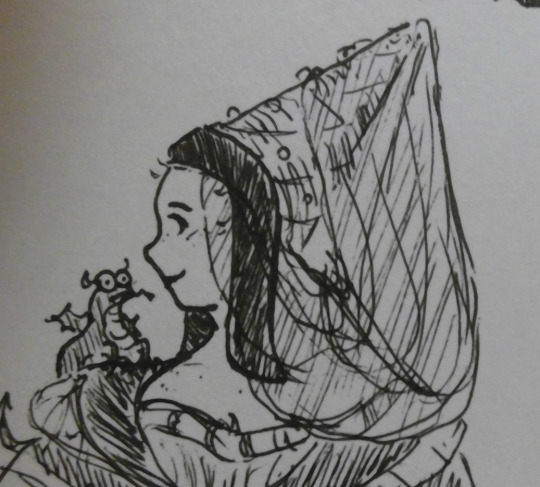

Granny has a hat, and an important one at that, but I swapped it out for a beer scumble helmet (due to Ogg shenanigans) to reward myself for following through with my daily sketch goals!
#discworld#discworld fanart#gnu terry pratchett#adora belle dearheart#susan sto helit#sybil ramkin#or#sybil deidre olgivanna vimes#granny weatherwax#co-starring#death of rats#quoth the raven#each with little straw hats#I really liked the idea of Susan in a straw hat#because she struck me as very Edwardian#and I loved the photos of kids (and select teenagers) running around with gigantic ribboned straw hats#bonus points if her grandfather passed it down to her#(from the bill door business)#I messed up Sybil's hennin multiple times#If Moist makes comments about the floppiness of Adora Belle's hat#she will respond by wearing progressively bigger and floppier hats to their dates#until he shuts up#no trimmings for her though#unless Moist somehow lands his hands on a little golem pin
44 notes
·
View notes
Text
Cockblocked by Batman’s son
BatCat | Humour/Romance | 1,4k
The fucker was on her for a while, and as much as their cat and bat game was fun, it was beginning to get in the middle of her business. There was this tiny small Brazilian island with her name on it, and unfortunately it was hard to steal whole islands than jewellery, so, of course, to steal some of the latter to get her island. She was calling it her retirement plan.
She was so close to her goal 12 million goal, only 10k to go, the job had been a god send, a rich collector had just acquired an Edwardian aquamarine and diamond brooch that have been on her client’s list for ages, thank goodness it was not her style at all, so she wouldn’t be tempted. It was easy enough, the security system was not what she expected from her research, but it had been fun to crack it, it was good to be surprised sometimes, she thought, kept her on her toes.
Her prize was already safely inside her bag, and Selina was ready to leave, when he appeared dark and broody, cape flowing behind him like a vampire on a silent era movie.
“Put it back.”
“Oh for Bastet’s sake!”
She ran, he went after her, and to be fair she was having fun taunting him, but there was something odd about that night, usually he gave her a little more of work, he seemed to be lagging. She even looked behind a few times to see if he was still following her, because there was nights in which would just leave to take care of an actual life threating crime. Selina thought that was the case and stopped to look, as much as the danger of him actually catching her and taking her prize back was not null, it almost felt like a let down when he’d just leave like that without a proper goodbye. He had no manners! Have no one taught him how to treat a lady?
Not that she was one.
She turned away and head back small rooftop apartment on East End, she had just entered her home, and pulled the cowl off her head when she felt a massive weight smash against her back throwing her on the floor. Fear struck her even harder, had the celling just fallen? She screamed for her cats to find safety before she managed to wiggle her body around enough to get an idea of the situation.
“What the actual fuck!”
The celling was intact and what was currently pressing her to the floor was the wall of meat known as the Batman.
“Put… it back.”
And then his eyes closed. She had never been close enough to notice before, but they were blue.
Read on AO3
It was embarrassing. She was tied up to a bomb. Heist gone wrong, well, it was good that he appeared since it was his fault that there was a heist at all. After leaving her flat while she napped after playing his personal Florence Nightingale all night, he repaid her by stealing her brooch!
Can you believe it?
The ingratitude?
The disrespect?
It was entirely his fault that she was obligated to break into that stupid warehouse to steal her new mark – an art deco diamond bracelet with an asscher cut, totally her style, she was already planning how to get it back, for free, of course. It was not her fault that the intel that got forgot to inform her that it was the same warehouse that had been used by Don Malone to hide drugs. And that when she broke in the place was no empty and Malone’s goons thought she was working for Falcone. Of course, no one believed her when she told them that she didn’t have anything to do with that.
You know, that’s why Selina had no trouble lying, because the truth hardly matters when someone wants to fuck you up, they will just do it for good measure, for fun, because sometimes you bloody deserve it for being the fool that nursed the fucking Batman back to health and were robbed by him.
But then, just as was she was about to accept that was how she’d meet her maker, a little leprechaun fell from the roof and said in a squeaky voice that she’d be okay.
“Geez, freaks are getting younger every day!”
Until Batman appeared and started defusing the bomb she thought she had already died and was having a very weird afterlife.
“He’s not a freak.”
“Oh… he’s with you!”
Maybe she was having a very weird afterlife. But why the hell her afterlife included the fucking Batman?
“He’s my… hmm… son.”
Wait, that was too weird for an afterlife.
“Your son? And his mother is okay with that? Jesus, isn’t he afraid of falling down?”
The boy had limbed a rope hanging from the roof and was hanging upside down by his pixie booted feet.
“He doesn’t have a mother,” Batman muttered as he still worked on her bomb, well, not hers. She owned no bombs, your honour. He was awfully talkative that night, that Batman. “Robin, behave!”
Oh my god, he was the leprechaun’s father! The information was just too good and at the same time she had no idea of what to do with it. It was the kind of prize she’d keep for herself.
“I’m behaving!” the high pitched boyish voice shouted back, but he did a flip and landed on the floor. She could say she was impressed. How old was that kid? Less than ten, she’d bet.
“Poor kitten, is she…”
“She died” he said so devoid of feeling that she raised an eyebrow. Of course Batman tended to be stoic, but, that was cold even for him.
“I’m sorry for your lost” she tried lamely.
He sighed. Batman actually sighed. What the hell was happening?
“I didn’t know her. He’s adopted.”
That night was one shocking revelation after another, wasn’t it?
“So… There isn’t a Mrs. Batman, then?”
What kind of lame line was that? Urgh. But was he… Nah. She was imagining it. He had not, in fact, sniffed her neck.
Of course, she couldn’t see, he was behind her, and although she could see Robin at the entrance very well because the light coming from outside reflected his little yellow cape as he amused himself by doing what looked like very dangerous acrobatics, where she was sitting, tied to a chair that was chained to a bomb, was completely dark. She could only hope he was really some sort of vampiric meta that could see in the dark otherwise letting him disarm the bomb was not the best of her decisions.
“It’s done.”
He released her. Selina rotated her wrists and stood up, relieved.
“Robin, let’s go!”
She watched as the boy let out a happy yelp and ran ahead, they could use that one as a limitless energy source and end climate change.
“Wait” she said walking around the chair to meet him in the dark “let me say thank you first, you just saved my life.”
“There’s no n-“
He couldn’t end the sentence when Selina blindly pressed her lips against his.
She meant to be a small playful peck, but Batman’s gloved hand slid to the small of her back, pulling her close and before she could think clearly about what she was doing, her arms were around his neck, hoisting her body up to fix their huge height difference issue. He parted her lips and slid his hot tongue against the roof of her mouth, the hard pointy part of his mask that protected his nose biting into her cheek.
“Ewww,” they broke the kiss to look at Robin’s small face wrinkled with disgust, but still remained in each other’s arms for a moment. And then, slowly, they turned their faces back forward.
Selina swallowed down, she still could taste him. And he was not letting her go, she had to be the one to pull her arms back, her hells touching the floor again.
She never thought she’d ever see Batman acting awkward but there was no other word to describe the way he grunted and stepped back before nodding to her and left, taking his little killjoy with him.
She stood there for a while.
She almost died.
She kissed the Batman.
Was cockblocked by Batman’s son.
Batman’s son??
What the fuck!
------------------------------
The rain made the power go out and I was looking through my WIPs. I really don’t remember writing this story lmao. But now It is finished and you can read it!
Please tell me what you think of it.
Kisses, see ya.
#batcat#brulina#baby batcat#gotham#selina kyle#bruce wayne#catwoman#batman#my fic#dick grayson#robin
16 notes
·
View notes
Text
Anonymous asked: Have you watched Lupin? What did you think? (And are you a fan of the books or other adaptations of the character?)
The short answer is yes, I have seen Lupin on Netflix. Overall I enjoyed it so long as I suspended my disbelief at certain things.
Unfortunately it took being struck down by Covid and being bedridden for me to actually to binge watch the whole series. So I was behind the curve when my friends, French and those outside of France, started to talk about it around me. I had to beg them not to give away spoilers until I had seen it all.
It did surprise me that it won rave widespread reviews outside France because usually French drama series don’t travel very well outside of France. I’m sure even Netflix had no idea how successful it would be for them. I’m sure being in Covid lockdown had something to do with it. In any case I don’t begrudge its success as it’s well earned.
However I wasn’t too surprised that within France itself the French reviews were decidely mixed and divisive. The critic at Le Point painfully hit the nail on the head when he wrote, “Le plus gros défaut de l'ensemble reste la pauvreté des personnages, tous unidimensionnels, caricaturaux et aussi épais que du papier à cigarette.“ - loosely translated as, ‘the biggest flaw of the whole thing remains the poverty of the characters, all one-dimensional, cartoonish and as thick as cigarette paper’.
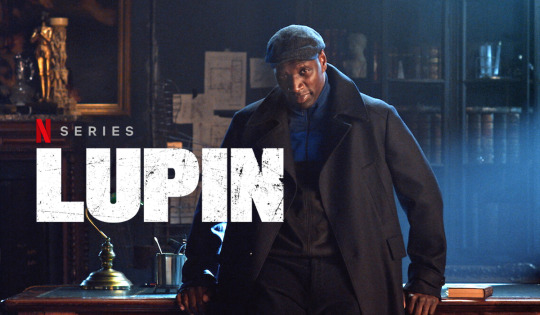
There’s a growing amount of good French stuff on TV and streaming services but a non-French audience will not have had the chance to have seen all of it yet. I can think of any number of French television drama/dramedy/cmedy series that are much better than Lupin with better plots, characters, and even a truer perspective of French society and even modern day France (Dix pour cent (Call My Agent!), Le Bureau des Légendes, Engrenages, Baron Noir, and Paris Police 1900). But you would be hard pressed to find anything that comes close to Lupin just for the sake of something fun to watch during the Covid lockdown.
What makes the current generation of home made French television series so interesting is how much of it is a reflection of France’s own anxieities about itself and its role in a increasingly English speaking dominating world. In a funny way it sees itself as defiant plucky Asterix fighting off the Roman American cultural hordes from totally invading their Francophone culture.
For sure, it has societal and racial issues stemming from its colonial legacy and issues of immigration and integration (France has the largest Muslim population in Europe). However it seems to want to ‘resolve’ these issues through the almost sacramental adherence to French secularist ideals rather than American inspired ideas of social justice and equity. There’s always been something very admirable about the French - from the time of General de Gaulle and perhaps before - always swinging from snooty ambivalence to outright antipathy towards the influence of American culture ‘americanising’ French culture (no to Walmarts or fast food chains for example).
Is it any wonder then that Netflix’s ill-conceived American series ‘Emily in Paris’ was widely hated and mocked within France for just perpetuating those lazy American tropes of Paris and French culture?

Personally I know Francophile Americans, long resident in Paris, who were frankly embarrassed and spent a lot of time apologising to their French friends. I have one American friend who has told me that she was so mad that she would have blind folded Emily and shoved her hard in the car boot and drive her all the way to the poorest of the banlieues in the grimey crime saturated suburbs of Paris - Seine-Saint-Denis came to mind - and dump her preening arse there. She would slap her and tell the spoilt entitied brat to make her own way back home - you know, to her spacious apartment in one of the most expensive arrondissements of Paris that of course(!) any American intern working for French marketing firms can afford.
I digress. My apologies. Watching this God awful show gives me PTSD.
Onto Lupin.
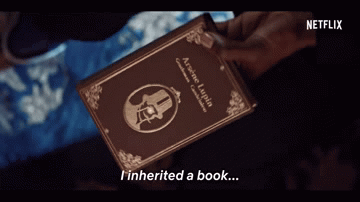
Thankfully Lupin doesn’t try to play to non-French tropes of what Paris is or isn’t. It does skim the surface of current discontents within French culture and society (race, class, power, and money) but ever so lightly so as to not get in the way of just spinning a good crowd pleasing yarn. It invites you to have fun and not to think too much. I have to be honest and say I enjoyed it as long as I suspended my disbelief here and there.
Lupin refers of course to the character Arsène Lupin, the French gentleman thief who stole jewellery from Parisian haute bourgeois and aristocracy at the turn of the century. Lupin, as written in the novels and short stories by Maurice Leblanc between 1905 and his death in 1941, was the archetypical anti-hero, a Robin Hood who stole from those who deserved it but kept the loot himself. He was often portrayed often a force for good, while operating on the wrong side of the law.
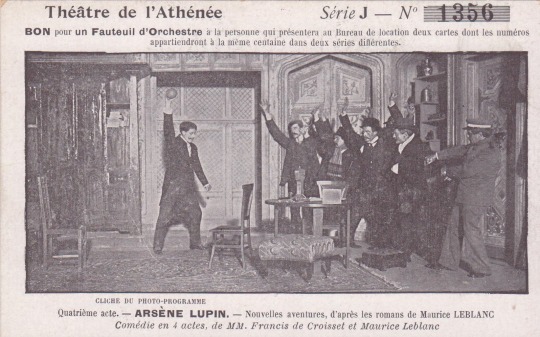
Lupin never really made much of an impact outside of France as he had within France where is revered with many French film and television adaptations. In England, we already had a Lupin type character in the form of A.J. Raffles, a cricket playing gentleman thief with his aristocratic side kick, Bunny. E.W. Horning’s stories of Raffles’ daring heists proved to be quite popular with the British public when Raffles first appeared on the scene in 1898. And even later Leslie Charteris’ The Saint took over the mantle from Raffles as the gentleman thief/adventuring Robin Hood.
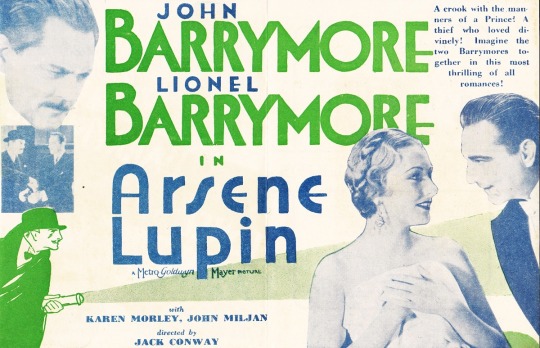
I think Hollywood tried to introduce him to an English speaking audience (legendary actor John Barrymore even played him) but he didn’t really take off and eventually they found their gentleman thief archetype in Sir Charles Lytton aka The Phantom (played by David Niven and Christopher Plummer) in the Pink Panther movies. So Lupin never got the English audience he deserved.
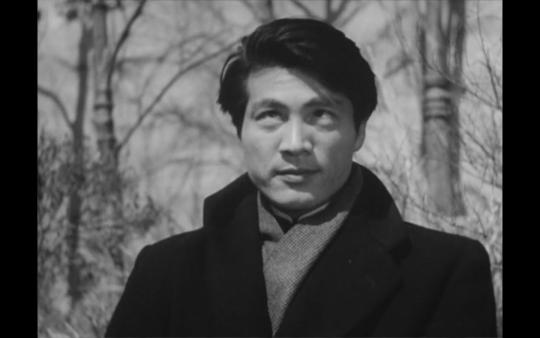
I first got wind of who Arsène Lupin was when I was growing up in Japan as a child. As strange as it sounds Lupin was big in Japan especially after World War Two. The Japanese did their own take on the Lupin character using Japanese actors and plot lines but it was Lupin.
I don’t know how exactly but I remember watching these scratchy DVDs of these Lupin inspired films. I think it was one of my parents’ Japanese friends who was mad for all things Lupin and he had studied French literature in France. Jogging my memory I now recall these black & white films were done in the 1950s. One starred Keiji Sada and the other version I remember was with Eija Okada (he was in Resnais’ classic film, Hiroshima Mon Amour) as Arsene Lupin called (I think) Kao-no Nai Otoko. I didn’t understand most of it at the time because it was all in Japanese and my Japanese (at the time) was pitiful, but it looked fun.
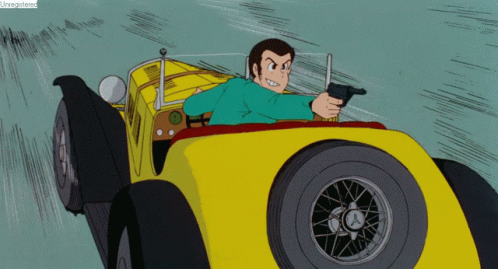
There was even a Japanese manga version of Lupin which was called Lupin III, - so named because he was the grandson of the real Arsène Lupin.

The 1960s manga series spawned generations of TV series which I do remember watching and finding it terribly exciting if somewhat confusing.
It was French expatriate friends whom my family knew that introduced me to the real Arsène Lupin. They had a few of the books authored by Maurice Leblanc. It was in French so I read them to improve my French but enjoyed the story along the way.
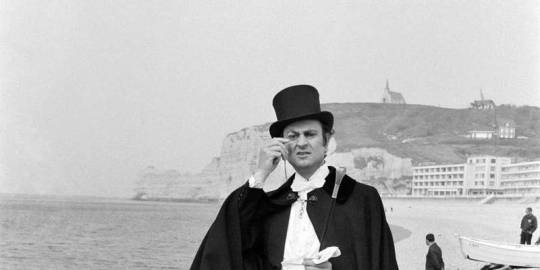
I also remember them showing me scratchy episodes of the 1970s Franco-German TV series ‘Arsène Lupin’ with the monocle wearing Georges Descrières in the lead role. It was a classical re-telling of the adventures of the aristocratic gentleman-burglar and very family friendly viewing. I don’t really remember much of it to be honest.
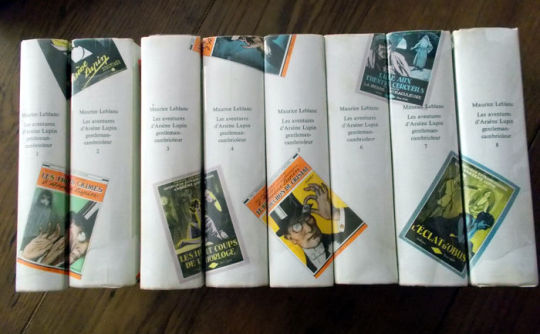
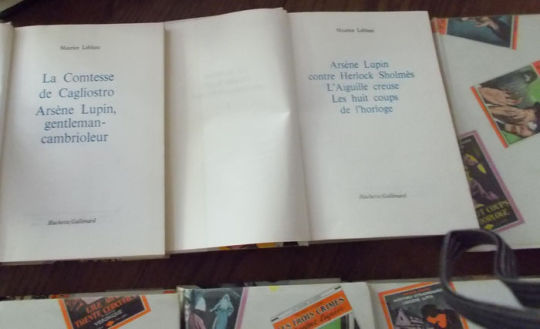
It was some years before I actually started to read more of the Maurice Leblanc’s novels and short stories collection. I have them all now. I was a teen and I remember being stuck in a snowed in a Swiss Alpine chalet and with nothing else to do but pull out a few dog eared books from the bookshelves belonging to our French host and read to pass the time.
I read Les Dents du tigre, Arsène Lupin vs Herlock Sholmes, and Les Huit Coups de l'horloge and thoroughly enjoyed them in the original French. I was already reading classic detective and mystery novels (Sherlock Holmes, Poirot etc) so it was natural to read the adventures of Arsène Lupin.
I haven’t got around to reading all the novels and short stories but I have read most of them and I enjoyed them all immensely. In the same way Conan Doyle, through Holmes and Watson, manages to conjure a convincing picture of late Victorian and early Edwardian England, so Leblanc manages to give us a taste of Belle Epoque France through the eyes of his suave gentleman-thief, Arsène Lupin.
Indeed it's a lot like reading Sherlock Holmes in that you're always trying to figure out how he did it, but the difference is that you are rooting for the bad guy. You can’t help but be drawn to this gentleman thief who is charming, comic, playful, and romantic and generous. Lupin is not an intellectual puzzle-solver but first a master criminal, later a detective helper, who maintains his curious ethics throughout his adventures. In this regard he is very much the anti-Sherlock Holmes; and I wasn’t disappointed when I actually read the story where Lupin faces off with Holmes himself. Brilliant!
I’ve also seen the 2004 French movie with Romain Duris in the Lupin lead role and it also starred the majestic Kristin Scott Thomas and the sexy Eva Green.
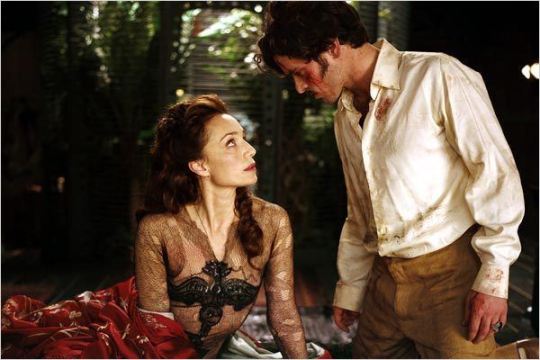
It was a decent adventure flick and it was a clear confluence of different Lupin novels (The Queen's Necklace (introducing Lupin's childhood), The Hollow Needle (where the treasure is the macguffin of the story), The Arrest of Arsène Lupin (the gala on the ship as a backdrop) and Josephine Balsamo, (one of Lupin’s most memorable opponents in the The Countess Of Cagliostro).
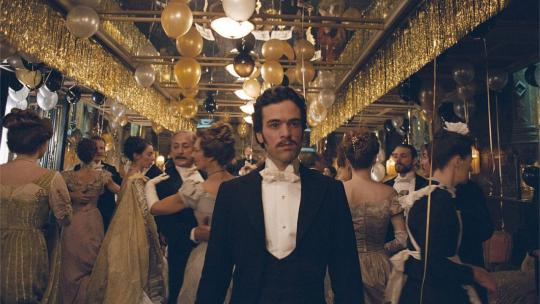
Romaine Duris, a fine classical actor, was I felt miscast because he didn’t have Lupin’s levity of wit and be at ease within himself. I love Duris in his other films but in Arsène Lupin and even in his other film, Moliere, he seemed ill at ease with the role. Perhaps that’s just me.
The latest Netflix adaptation (or reimagining to be more precise) is a welcome addition to the world of Arsène Lupin.If you don’t over-think it, it’s bags of fun.
Omar Sy is immensely likeable. Sy is a deservedly a big star in France - he won the best actor César for “The Intouchables,” an international hit - and has played forgettable secondary characters in big-budget American special effects movies (he was Chris Pratt’s assistant in “Jurassic World” and a minor mutant in “X-Men: Days of Future Past”). It was reportedly his desire to play Arsène Lupin, whom he’s compared to James Bond (“fun, funny, elegant”), that led to the series, created by British writer George Kay. And it is on his charm that the series largely, though not entirely, rests.
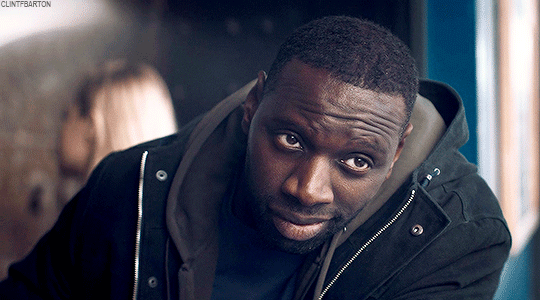
So the basic story revolves around a jewellery heist. Sy plays Assane Diop, a first-generation French-Senegalese man in contemporary Paris. A collection of Lupin stories, a gift from his father - whose undeserved fate Assane set himself to avenge in long-delayed, Count of Monte Cristo style upon a criminal tycoon - has made the actual Lupin books a foundation of his life and profitably illicit career. This fan-ship goes as far as borrowing practical ideas from the stories and constructing aliases out of anagrams of “Arsene Lupin,” a habit that will attract the interest of a low-level police detective (Soufiane Guerrab as Youssef Guedira) who shares Assane’s love of the books. (That the detective also shares an initial with Lupin’s own adversary, Inspector Ganimard, is possibly not a coincidence.)
Among the many comic delights of Lupin, is an unspoken one. Time and again, the show’s hero, master thief Assane Diop is able to slip into a place unnoticed, or by assuming a minor disguise that prevents witnesses from providing an accurate description of him to law enforcement.
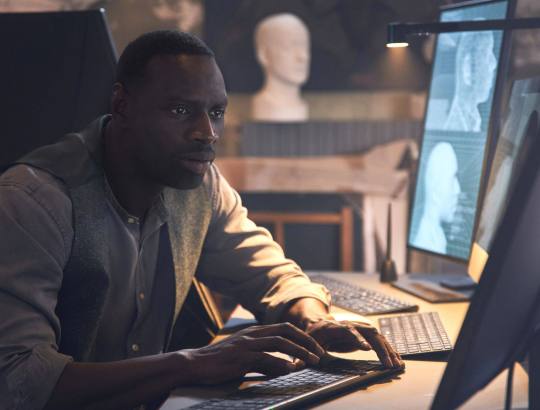
Why is this funny?
Because Omar Sy is six feet three (and, since most actors are short, seems even taller), is roughly as wide as soccer pitch, and is memorable even before he flashes his infectious million-Euro smile. This is not a man for whom anonymity should be possible - even allowing for racial bias in a majority-white country, Assane would be memorable and distinctive - and Lupin seems cheekily aware of this. Like the various incredible sleights of hand Assane deploys to pull off his thefts and escapes, his ability to be anyone, anywhere, is treated more as a superpower than as something even the world’s greatest criminal would be able to pull off.
At one point, when he’s slated for a cable news appearance as a much older man, we learn that Assane is also a master of disguise. The revelation of this skill arrives with a wink in the show, and it feels pointless to ask where he learned it, or how he affords movie-quality latex and makeup. Or rather, asking the question feels wrong.
We know this is impossible, the show seems to be asking its viewers again and again, but isn’t it so much fun?

The performances and the production - it has that particularly European filmic quality of feeling natural even when it gets stylish - keep the series warm even as the plot is made up of incredulous contraptions that require everything to go right at just the right time and for human psychology to be 100% predictable. Its physics are classical rather than quantum, one might say, and like the world itself, which becomes more curious the deeper you peer into things, it is best handled along the surface. You do not want to take too much time working out the likelihood of any of this happening. Just go along for the ride.
Somehow, though, it all works because Sy is so magnetic and charming that questioning plot logic feels wildly besides the point. Though he never looks appreciably different in his various aliases (including one ill-conceived live-TV appearance done under old-man makeup and a thick beard), he changes his posture and voice ( if you watch it in French that is) enough to allow for the willing suspension of disbelief, in the same way that any lead actor as Superman has to do when playing Clark Kent. But Sy and the show are at their strongest when Assane is just being his own Superman self, utterly relaxed and confident in his own skin, and so captivating that his ex-partner, Claire, can’t really resist him despite ample reason to.
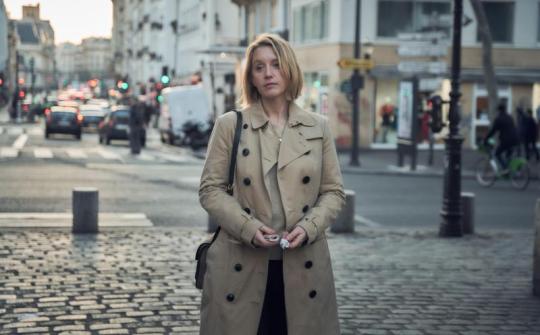
If Assane seems practically perfect in every way, he is not perfectly perfect. His most obvious failing is that his criminal shenanigans and revenging make him less than reliable in his daily life, affecting his relationships with ex-partner Claire (Ludivine Sagnier, whom non-French audiences might recognise from “The Young Pope” and “The New Pope”), who despairs of his inability to show up on time to see his son Raoul (Etan Simon). Like Sy, Sagnier brings a lot of soul to her part - though onscreen far less, she’s as important as Sy to the series’ success - and the two actors have great chemistry. Also impressive and key to creating sympathy are the actors who play their flashback teenage selves, Mamadou Haidara and Ludmilla Makowski. Really, you could do away with action elements and build a series around them.
This is a pity because Lupin often fumbles its emotional reveals in other parts - the story of Diop being torn between his job and his family feels like wheel-spinning, rather than genuine emotional intrigue.

Soufiane Guerrab is wasted in the Young Detective Consumed by the Case role and spends most of this season pinning colour printouts of book covers to cork boards and getting waved off by his colleagues, who are all blinded or otherwise hampered by careerism.
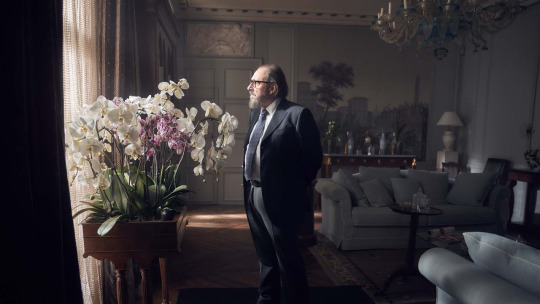
But to my mind the weakest link is the villain himself and his daughter. Veteran actor Hervé Pierre hams it up as Hubert Pellegrini, a business tycoon who is the patriarch of the Pellegrini family. He just comes across as animated cartoon villain with no character depth (think moustache twirling Russian villain, Boris Badenov, in the Rocky & Bullwinkle cartoon shows). He just emotes anger a lot without any nuance or hint of complexity.
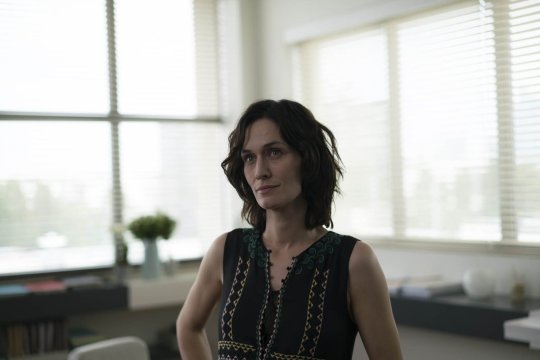
Even Clotilde Hesme who plays the daughter who is unaware of her father’s criminal tendencies is miscast. For the record I adore Clotilde Hesme as she one of France’s most talented classical actresses (that non-French outsiders will not have heard of). She is a classically theatre trained actress and is one of the best stage actresses of her generation that I have ever seen. I’ve seen her in plays where she is just mesmerising. She has said before that she’s more comfortable on the stage than she is on the screen. And when she has been on screen she still has been a powerful presence. She’s actually won a César too. Here in Lupin, she seems to have no agency and looks bored with nothing really to do.I really hope they give her more scenes in the next part of Lupin.
The series is at its best when following Diop enacting his plans, and when revealing each one from a different vantage, making us privy to every moving part like a magician revealing his secrets. The show captures the momentum of a clockwork heist, the tension of sudden obstacles and the ingenuity of improvised responses, with thrilling precision (especially in “Chapter 1 - Le Collier de la reine,” directed by Now You See Me’s Louis Leterrier).
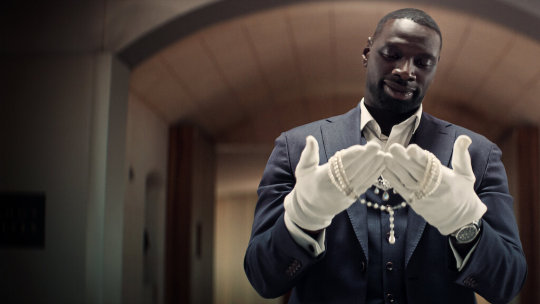
Lupin is also politically incisive when it wants to be; it brings to mind Ladj Ly’s Oscar-nominated 2019 film Les Misérables, which adapted the broad strokes of Victor Hugo’s novel about the 1832 Paris Rebellion, and modernised the story by focusing on the police brutality faced by non-white Parisians.
Lupin opens with Diop disguised as cleaning staff and entering the Louvre after-hours, alongside dozens of forgotten, anonymous non-white workers as they pass by “La Liberté guidant le people,” Eugène Delacroix’s famous painting of the July Revolution of 1830 which replaced France’s hereditary rule with popular sovereignty.
Before any semblance of plot or character, Lupin centres broken ideals and promises unkept (without giving too much away, the show’s primary villain has much more nationalistic view of French culture and history which merely adds to a cartoonish caricature than a complex character). The rest of the episode is about valuable jewels once owned by Marie Antionette - one of the most recognisable symbols of wealth and extravagance in times of extreme poverty - which are put up for auction by the Pelligrini family, and bid on by other wealthy collectors with bottomless purses and no sense of irony.
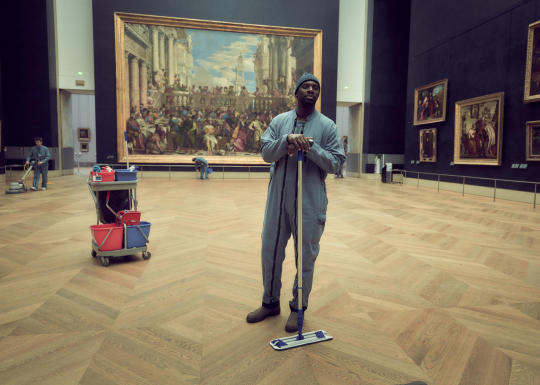
Granted, beyond this auction subplot, explorations of race and class are largely limited to individual interactions, but the show continues to refer back to (and implicitly comment on) its source material in ways that wink at the audience. An elderly, unassuming target of Diop’s schemes seems like an unlikely victim at first - Diop, though he acts in his own self-interest, usually displays a moral compass - until this victim reveals the colonial origins of her wealth, immediately re-contextualising the ethics of the situation, in a manner that Leblanc’s stories did not. (The show is yet to apply this lens to Arsène Lupin himself, who Diop treats with reverence, but that’s a secondary concern since Lupin is entirely fictional in-world).
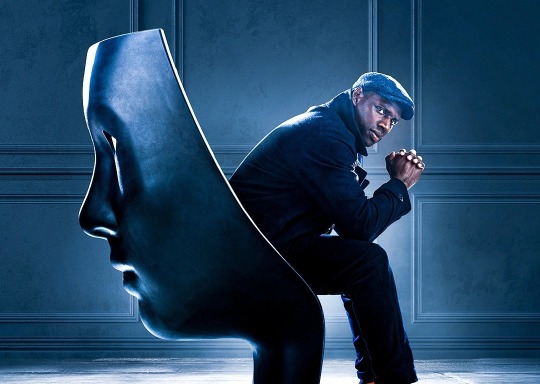
Barring some nagging structural problems - like cutting to flashbacks when things are getting exciting, or epilogues that feel ten minutes too long - Lupin mostly works. It plants a few personal seeds early on, which it keeps hinting at without fully addressing, but by the time its scattered elements come into focus, the show finally figures out how to weave them together, and delivers a mid-season cliffhanger that renders many of these flaws irrelevant.
Lupin manages to have fun even with an antiquated premise - the story of a suave con-man who charms his way through high-profile robberies - while adding just enough new spin on the concept to feel refreshing. Omar Sy may not have much to work with, but his alluring presence makes Assane Diop feel like a worthy successor to Arsène Lupin.
Lupin isn’t going to win César, BAFTA, or Emmy awards, or even turn heads for its ability to develop tertiary or even secondary plots or characters - that doesn’t really matter. You’re there to see a difficult hero be difficult and heroic - everyone else is there to be charmed, vexed, or eluded by them. Sy’s performance bounds off the screen, and is almost musical. He floats through scenes like he glides over the roofs and through the back alleys of Paris; he outmanoeuvres his foes with superior literary references and sheer athleticism. He is irresistible and also good at everything he tries, even kidnapping.
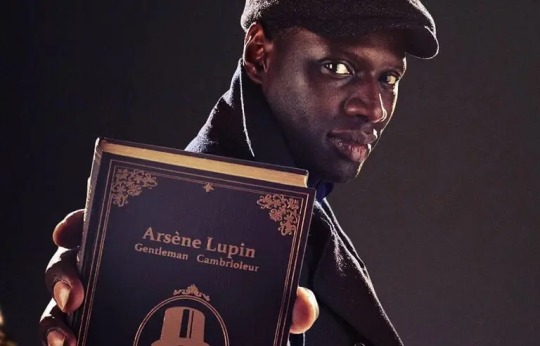
I would encourage anyone to watch Lupin for a fun care free ride. But the only caveat I would make is watch it in the original French.
If you don’t know French then put on the subtitles to understand (that’s what they are there for). The real crime is to watch this (or any film or television series) dubbed in a foreign language. It’s disrespectful to the actors and film makers and it’s silly because it’s comical to watch something dubbed over.
Please watch it in the original French.
Then go and read the books. You won’t regret it.
Thanks for your question.
#question#ask#lupin#omar sy#netflix#tv show#culture#personal#arsene lupin#japan#maurice leblanc#france#french#society#arts
48 notes
·
View notes
Text
Okay, my overall thoughts on the Bridgerton costumes in this post. Main theme: I love the concept of the aesthetic, but I don’t think they pulled it off skillfully.
I understand where Ellen Mirojnick is coming from when she says that they wanted it to not be “like a Jane Austen adaptation” and to be “scandalous and modern”. The thing is, I think her idea of what a Jane Austen adaptation is is stuck in the 1980s and 1990s - heritage films with a “realistic” muted palette and lots of caps and lace. Certainly after Emma (2020) it’s hard to argue that Jane Austen means blah, but even going back to the divisive Pride & Prejudice (2005) there's substantial use of vivid color and deliberate inaccuracy. In her interview with Vogue, she said “This show is sexy, fun and far more accessible than your average restrained period drama and it’s important for the openness of the necklines to reflect that,” which again reflects this odd view of costume dramas that just doesn’t fit reality - people have been making deliberately sexy and accessible period shows for the past twenty to thirty years, and low necklines appear constantly. (Check out this FrockFlicks post on bad girls in Austen adaptations ...)
And here’s the crux of the matter to me - if you want to do lower necklines, for instance, there are much more flattering and much sexier ways of doing it right at hand in history. Take a look at this portrait of Charlotte Sparrow (dated 1815-1820 but I would put it at 1810):
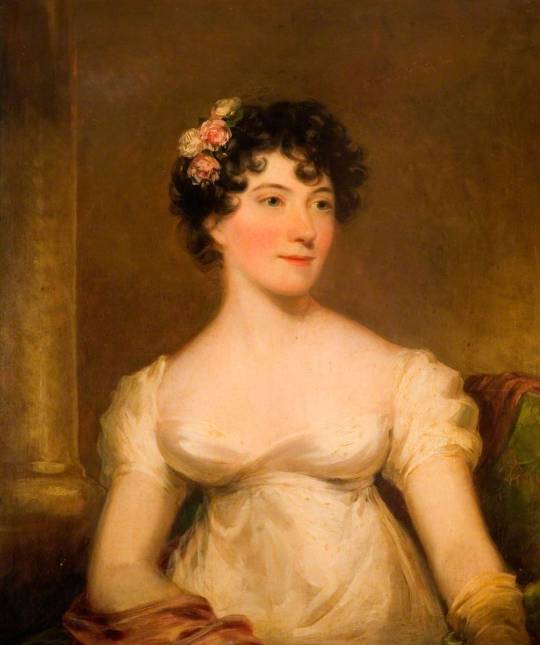
The Bridgerton necklines are downright modest in comparison. They only seem ~shockingly low~ at all because the corsets look painfully restrictive in the bust - they have some inserted gussets, but it looks like they are basically tubes, for the most part. (According to Vogue they had Mr. Pearl make the corsets, which at first struck me as incredible, but then I realized that Mr. Pearl is famous for making tight-lacing underbust corsets, or mid-bust ones that don’t offer much support. Paying Mr. Pearl to make the corsets for something set in a period where the waist doesn’t matter at all and the engineering of the bust is very important is a waste of money - Redthreaded would have done better. Flattening the actresses’ boobs just isn’t as sexy as curves, I’m sorry.)
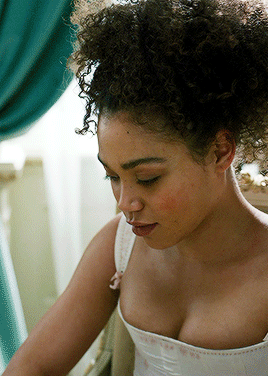
(gif from @dearemma)
I ADORE the use of anachronistic fabrics to highlight the Featheringtons’ nouveau riche lack of taste - it’s very fun! I definitely get more than a bit of a hint of what Sandy Powell did in Cinderella. There are also a number of costumes with Edwardian-ish beading, or tulip sleeves, or highly draped and pleated bodices that are anachronisms that give a kind of heightened feeling to the show that takes it from Regency England to Regencyromancelandia, which is great, because that is actually where Regency romances are set - a world with a jillion dukes and earls, phrases like “diamond of the first water”, and the period of her debut being the most important time in a girl’s life socially.
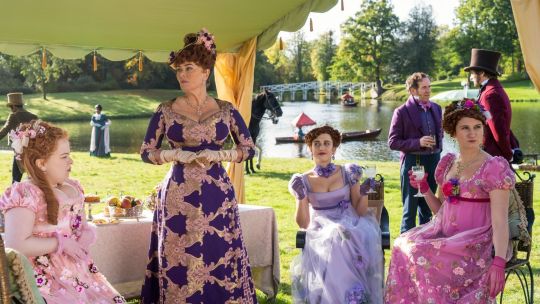
But the thing is that using interesting materials or taking inspiration from different periods doesn’t cancel out making poorly-fitted clothes. Sandy Powell can do whatever she wants because she does it so darned well! (Alexandra Byrne too, IMO.) Between the extremely flattening corsets and the misplaced waistlines of the gowns, most of the women look like they’re shaped like tubes. I haven’t seen anything from Mirojnick to indicate that she wanted them to be tubular, so this seems like a case of nobody working on this having any idea how to fit a Regency gown. And it’s distracting and frankly unattractive. You can’t get full points on concept alone.
Something else that needs to be talked about is the sexism of focusing 95% of the effort of reading sexy and modern on the female actors and their wardrobes, as @marzipanandminutiae has discussed. The men in this show are, by and large, accurately dressed. The one concession to modernity there is Simon’s short hair and stubble, fanciful fabrics for his waistcoats, and neckwear worn next to the skin. Almost the entire focus of the modernization/stylization was put into the appearances of the female characters. Mirojnick can accept that men are sexy in very concealing coats and waistcoats with a hint of earthy sensuality, but every single female character who’s considered an adult must be dressed in a corset designed to smash her breasts up into hella cleavage and a neckline that shows off said cleavage in order to be Not Your Granny’s Regency Lady.
88 notes
·
View notes
Text
Ghosthood Chronology at Button House with a Few Thoughts
(Obviously not covering whatever unknown ghosts that haunted the property in the past but have since been sucked off.)
Robin: died thousands and thousands of years ago. It’s just him and the moon left over from that time. If there were any other ghosts from his period all the way to the middle ages, they long ago got sucked off. The modern world is totally unrecognizable to the one Robin lived in, but he’s been dead long enough he’s somehow managed to adapt to all of it. Since he seems to enjoy seeing and learning new things, and seems to enjoy himself the most frequently, I suspect Robin is still a ghost because he likes to be.
The Plague Pit Ghosts: died sometime between 1348 and 1349. This was before Button House was constructed, so presumably they just sort of wandered around the grounds at the time. I wonder if Robin used to hang out with them? I wonder if there were more of them at one point and some of them have been sucked off while others remain or if they find having a significant portion of their community there together satisfying enough that they’ve all been content to stay? I wonder when they decided to move into the basement? Was it like, right after Button (Highham) House was built or did it take them a while? And what made them decide to form their own little enclave?
Humphrey: died sometime between 1509 and 1603. Obviously, again, we don’t know what other ghosts might have been there at the time and later got sucked off, but from the ghosts we do know were present, his arrival must have reflected a huge class difference. Barring unknown sucked off ghosts, the rest of the ghosts were all lower class until Kitty came along. Like, how did the village’s worth of dead peasants react to suddenly having a decapitated lord also ghosting on the property? And how did he react to them plus a caveman? Humphrey is fantastically chill in modern times, but few Tudor noblemen actually were, so was he, like, a raging dick for the first few centuries before he mellowed out and that could be an explanation for why so many of the other ghosts just ignore him now? Or did, like, he and Robin hang out, since the Plague Pit folks seem content to be their own unit? I personally suspect that when his head ends up weird places, it’s Robin that’s putting him there. Robin’s almost certainly the one who put him Alison’s medicine cabinet, at the very least.
Mary: died sometime in the seventeenth century, most likely in the first half of it. Annie, the sucked off Puritan, would have died in a similar time frame, and they seemed to be steady companions until Annie was sucked off. The composition of the house ghosts turns after Mary’s death from mostly peasants to mostly upper class. I wonder how Mary took the house slowly shifting from mostly peasant to mostly well off and frequently kind of snobby?
Kitty: died somewhere between 1714 and say, the 1790s? I could probably pin it closer if I knew more about historical fashion- and presuming they went with period accurate fashion- but I don’t. Kitty’s a fairly sunny and gregarious person, but the distance between her and her predecessors in terms of class, culture, and time was pretty large. In the Thomas Thorne Affair flashbacks, she spends most of the time alone, until the duel, while Mary’s with Annie, Humphrey’s abandoned on the stairs, and Robin’s off doing his own thing. Series 2 sees her becoming friends with Mary, but that’s several hundred years after they both died. Maybe it never happened before that because when Kitty arrived Mary already had a best friend in Annie?
Thomas: died in 1824. I suspect he’s spent most of his afterlife sighing and pining over women. Kitty seems to be in his fan club, probably because they both have romantic tendencies, but he’s never struck me as particularly close to any of the other ghosts.
Fanny: died sometime between 1901 and 1910, but considering she identifies as Edwardian, I’m guessing it was toward the later end of that time frame. Fanny was the first ghost from recognizable modernity, with electricity and cars and such. She’s also the first to come out on our end of Victorian sensibilities and traditions, which were rather different from everything that came before them. She seems to prefer the company of Cap and maybe Pat, who died after her, but is willing to talk to- or at, at least- everyone in the house. She was the lady of the house and probably used to ordering everyone in it around. I don’t imagine her conception of herself as such changed after she died, so I imagine she took charge upon arrival, at least until Cap and Pat arrived and took over a lot of the day-to-day leadership- but they both noticeably still defer to her.
The Captain: died in 1945 or later. I suspect 1945, personally, but it could have been longer. Pat didn’t turn up for nearly another 40 years, so I imagine he was pretty lonely in his initial ghosthood, with Fanny as his main companion (who, as the Edwardian matriarch, would have been rather more akin to his mother than him). But then, I imagine he was probably pretty lonely in his life, too. He envisions himself as the group leader, but the extent to which that is true outside of crisis situations is questionable.
Pat: died in 1984. The world has changed enough since the eighties so that a lot of things from now are new and exciting to him but it hasn’t changed enough to be unrecognizable and he still has living family, so he isn’t as far removed from the world as the rest of the ghosts. Taking on the same sort of activity coordinator and facilitator role he had as a scout master, on a practical level, he’s the one who most frequently is actually the group leader.
Julian: died in 1993. He lived to see the end of the Cold War, computers become common, and, depending exactly when he died, might have seen the start of the public internet, so the world isn’t particularly different for him from when he died, at least on the macro-scale. The circumstances of his death were awkward, though- naked below the waist and in some sort of sex act- and I wonder how long it took for it to stop being awkward with the other ghosts? Particularly the more repressed ones, like Fanny and Captain. He eventually developed a chess-playing friendship with Robin and I wonder when and how that occurred. Did Robin already know how to play chess? If so, when did he learn and did anyone else ever play with him? Also: did Julian ever try to smarm his way into the other ghosts’ good books or was he an obviously shameless immoral Tory from the start?
#bbc ghosts#robin the cave man#the plague pit ghosts#headless humphrey#mary#kitty#thomas thorne#lady fanny button#the captain#pat butcher#julian fawcett
54 notes
·
View notes
Note
ER period drama AU? Era is totally up to you
So my immediate thought was "typical Victorian Era AU" because that's where my mind initially went. However, while I was out on my walk, I started thinking about my personal favorite era, which is the Edwardian Era/1910s. But that led me to thinking about Chicago in the late 1800s, so I ultimately arrived on "1890s vigilante (ish) AU" (so big TW for violence and abuse)
1. The philanthropy of the Carter family meld with the servant nature of the Weaver family to create the Carter House, a settlement house that offers classes and basic services to people regardless of class, color, or creed. The Carter is a lot less hands-on than the Weaver family is, with the exception of John Truman Carter III, who runs the medical clinic inside the house.
2. Day-to-day operations are overseen by Ms. Kerry Weaver, daughter of the co-founders. She has a hand in every pie, and regularly helps out in any area that needs it, from the kitchen to the classrooms. Those visiting the Carter House are treated with respect and care regardless of who they are, but must follow the rules while they are there as enforced by Ms. Weaver. The click of her cane is a warning to be on your best behavior or else face the consequences. Those who have faced the consequences spread a cruel rumor to other visitors that her limp is due to a run in with the dagger she keeps hidden under her dress. They are wrong on both accounts; a dagger did not cause her disability nor does she carry one. She instead carries a pistol. (As anytime you are welcoming to all, you will encounter those who see that as a problem.)
3. Susan Lewis runs an inn in the same neighborhood as the Carter house, but those who know it say it appeals to a much shadier audience. They are not entirely wrong, as those who frequent The Drunken Dame Inn often run into those who have been found on the wrong side of the law. But what they do not understand is that it specifically caters to those who have been wronged by the law. Sex workers, addicts, criminals those whose "crimes" have more to do with who they are than something they did - this inn was meant to be their haven. It was founded on behalf of her late sister Chloe, who fell in with some bad people and ultimately paid the price for it with her life. Susan couldn't save her, but perhaps she can save someone else.
4. Doug Ross is the police captain for the neighborhood. He considers himself above the corruption of his peers, but only in so much as he doesn't take bribes to look the other way. But sometimes he gets pushed over the edge and steps outside of the rule of the badge. This happens mostly when he sees children abused by their caregivers or newboys struck by the wealthy who see the children as beneath them (as evidenced by the way they kick at them). He does his best not to do anything while on the beat, but as soon as he is off the clock, he deals his own brand of justice. He is always careful, though, never to do so in front of the children.
5. Mark is a green(e) grocer. Elizabeth runs one of the most powerful gangs in the entire city. Everyone assumes that Mark either doesn't know what his wife does or just doesn't care. The truth is a mix of both. Elizabeth is very good at dodging questions and basically has made Mark think she does work in protecting the vulnerable a la the Carter House or Susan's inn. It's not entirely a lie, but it leaves out many key (and sometimes gruesome) details. Mark thinks she's just protecting those she serves, so he doesn't pry. When asked about his wife's work, he just says he thinks it's nice that she is so passionate about her work in the community.
#this spiraled from just 'er period au' but hopefully it is appreciated#because i had a lot of fun with this one#thank you for asking!!#asked and answered#au ask game#nbc er
14 notes
·
View notes
Text
Book Review: Daughters of the Winter Queen by Nancy Goldstone
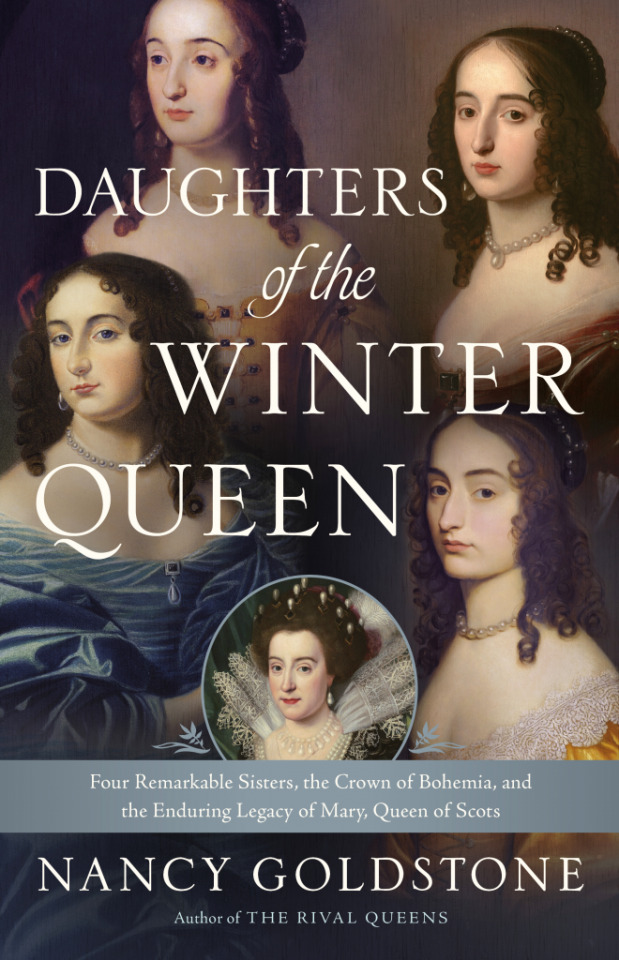
Now I know must be thinking a certain way when you look at the name Nancy Goldstone. However, hear me out please. I am fully aware of the massive controversies in regards to Goldstone’s latest book about Empress Maria Theresa of Austria and her daughters (including Queen Marie Antoinette of France). Knowing of the inaccuracies and other controversies in the latest book in thanks to people on this site who are more well versed in Marie Antoinette and King Louis XIV of France than I am, I don’t have the slightest interest in buying that book and others with the exception of Daughters of the Winter Queen and The Lady Queen which I already read a year ago.
That being said, I wanted to read Daughters of the Winter Queen because I was interested in learning more about Princess Elizabeth Stuart, the daughter of King James I of England and VI of Scotland, and her children. I know a lot about Elizabeth’s paternal grandmother, the infamous Mary, Queen of Scots. I even currently learning about Elizabeth’s younger brother King Charles I of England (along with Victorian and Edwardian royals of course). Now I had gotten the chance to read this book after being on my TBR list for about 2 years, I have quite a bit to say and I can see why Goldstone has mixed reviews.
First the positives. Again, I know very little info about Elizabeth Stuart, the Winter Queen and her children. I found the book very informative. Goldstone brings life to the feisty Elizabeth and her daughters: (another) intellectual Elizabeth, the artistic Louise Hollandine, the gentle Henrietta Maria (who was named after her aunt) and the witty Sophia (the matriach of the Hanoverian dynasty in Great Britain). I also liked how Goldstone brought life to Elizabeth’s husband and sons as well. Finally, I also liked how Goldstone written the flaws of the protagonists in this book along with the strengths. What struck me was how the family was always strapped for cash due to the Thirty Years‘ War and the turbulent political instability in her homeland (England) that lead to the execution of her younger brother. Eventually, the family’s fortune risen after the end of the Thirty Years’ War and the restoration of Elizabeth’s nephew King Charles II.
Noe the negatives. My biggest gripe about Goldstone’s tone during the majority of the book. I can’t really describe it in words except that it feels like one trying to be hip for the younger generation, but fails. While I understand she is trying to be approachable to a general audience who have an interest in history, royal history, history of internationa relations and so on, I honestly found some of Goldstone’s modern references to be unnecessary. That and the strange sentences at the end of each chapter.
My overall rating for Daughters of the Winter Queen is 3.5/5. Yes, some of you think I am being a bit too generous here, but it’s because of the information.
1 note
·
View note
Photo

~Henry VII: The Red Dragon’s Unlikely Triumph~
Henry’s victory to success is simply amazing due to how far down he was in the line of succession -if he was at all! Of all the Tudors, and don’t get me wrong I love them all! He had the most adventurous life! His life is the stuff of movies and you’ll see why. Henry was born to Edmund Tudor, Earl of Richmond and Margaret Beaufort, heiress of Lancaster in Philippa Gregory’s words. But she was far removed from the line of succession! The Beauforts derived their name from a castle John of Gaunt had in his possession in English occupied French territory. John of Gaunt married three times, the last to his mistress Katherine Swybford. When they married their children were already grown up but by no means less ambitious. In an effort to ingratiate himself with the shifty king Richard II, John betrayed many of his comrades and persecuted anyone who stood against the king, his nephew. In return for his good services, Richard II legitimized all the Beauforts but that’s it. No say if they were inthe succession or not. Later after John died, his firstborn, Henry Bolingbroke ascended to the throne after he deposed Richard. He didn’t overturn Richard’s legislation but added a new restriction: The Beauforts were legitimate in the eyes of the law of men but due to their revious bastard status they were excluded from the line of succession. So bye-bye ambitions. By the time Henry IV’s grandson had issue, this changed altogether. Their descendants were still seen as progeny of a bastard branch (albeit legitimized) of the House of Lancaster but their status had changed overnight as support build around the Duke of York and his Neville relations (who also descended from the Beaufort line, but through the female line). Henry VI betrothed his young relation, Margaret Beaufort to his half brother Edmund Tudor. He was thirteen years her senior and while it was common for women to be married at a young age, people still found it disturbing because the groom didn’t wait for her to grow up. As soon as she was 12, he married her and the next year she was pregnant.Edmund and his brother Jasper had supported the Duke of York on various occasions but when the conflict escalated to war, the Tudor brothers sided with their kin. Edmund was captured during battle in late 1456 and died in attenpts to escape, possibly of sickness. Margaret , thirteen at a time, was already a young widow and expectant mother. She feared for her safety and the safety of her unborn child so she started a dangerous sojourn to Wales, to Pembroke castle where her brother in law resided. There, she gave birth to her only child, a boy she named Henry.Henry did not have a lonely childhood like some Ricardians and fiction writerss love to depict, nor was his mother a crazy fanatic. She was the same as the rest of the women. Religion was not separate, it was part of women’s lives, especially the adoration of female saints and the virgin Mary from whom women kept relics and images to pray to so they could be safely delivered or to protect their young. Of this latter cult, Henry became a firm follower, worshipping the image of the blessed mother with the same fervor as his mother. Likely, the little boy had childhood companions like David Owen, the illegitimate son of his grandfather by an unknown mistress. In spite of her second marriage, Margaret was allowed to visit her little boy and spend hours teaching him, but then her fortunes changed when Edward Earl of March forced the Lancastrians to flee and was declared king by popular acclaim in March 4 1461. Margaret and her new husband now had to curry favor with the new regime and to prove their loyalty, they had to let her son go. Edward saw Henry Tudor as a potential threat and to neutralize this threat he gave his custody to a loyal Yorkist, William Herbert and his wife Anne. They raised Henry as if he was one of their own, and he had the company of the new Earl’s other wards. But Henry knew that a prison made of gold was still a prison. One mistake from his mother, his guadians or worse, his runaway uncle and he would be dealt with.After the Lancastrian Readeption which only lasted a year, Jasper Tudor was forced to flee yet again. This time he took his nephew with him. The deaths of every Lancaster made Henry a potential threat. Every male Beaufort was also gone. Margaret had to let him go once more, this time she would not see him for another fourteen years.Bad weather brought them to the court of Francis II, Duke of Brittany. There he continued his education, by the time of Richard III’s accession, he enjoyed the company of many English exiles, among them the formidable and staunch Lancastrian loyalist -Earl of Oxford. It was in Brittanny, that December of 1483 after it was clear that the princes were gone for good, that he made a promise to marry Elizabeth of York and become King of England, thus uniting both bloodlines, the Houses of York and Lancaster into one.The next year and a half he spent his time planning, borrowing money and now in the court of France, currying favor with the French king. He had tried to invade England but failed. What made Henry think, the French king and others told him, he could succeed? But they didn’t know Henry. He was by now an educated, cosmopolitan young man who was also confident that god was on his side. On July 29 1485, Richard III gave the seal to Barrow, one of his officials to carry out his orders in the counties nearby and prepare for war.To be fair, Richard III was the most experienced soldier here. He had known the horrors of war since he was very little and his life parallels Henry’s but unlike the latter he had been participant in many military campaigns and had the entire North at his disposal. Henry had mercenaries, disatisfied English exiles, Edwardian Yorkists and most of Wales with him, but that was not enough to beat Richard’s armies. On August 7, Henry’s ships docked on Milford Haven. According to Fabyan when he disembarked he knelt and thanked god, reciting the Psalm 43: ‘Judica me deus & discern causam mean’. -Judge me, Oh god, and distinguish my cause. The following days he spent recruiting, some of Richard’s most staunch supporters defected to Henry, others refused to fight and just stood by as the two armies clashed on August 22. Others like his stepfather, chose to intervene in his favor only when the tide turned against him. After William Brandon, his standard bearer was struck down, Stanley and his brother with his armies charged down, and with their combined forced Richard’s was cut down. Richard, according to various sources screamed 'traitors’ and refused to go, instead seeking to confront Henry, but he never got to. The enemy got to him and he was forced down from his horse and minutes later, killed. It was a glorious day for Henry Tudor, now Henry VII. He had won against all odds, but the war was from over. Henry would face many pretenders and plots against him, his mother knew and she cried tears of fear, likely anticipating all her son would have to endure. He died in 1509 after twenty four years of reign.
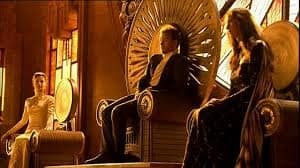
In relation to Paul Atreides from DUNE MESSIAH onwards …
While DUNE, the first published novel of Frank Herbert set in the Dune universe is the book every reader should start with; DUNE MESSIAH is the most crucial one of ALL Dune novels because rather than reading like a science fiction novel or another inclusion into this space opera, it reads like a narrative tale that is chronicling events that already happened. For a history buff, this novel is the deciding book in the series that sets the tone for the rest of the saga. Additionally, aside from being a deconstruction of the hero mythos, it is also a critique of history.
From the onset, the book starts with one of many historians being killed simply because he wanted to tell the truth. But obviously, Muad’Dib, the grand emperor Paul Atreides with his ongoing Jihad spread across the Known Universe can’t have that. So … what does he do? He starts rewriting the past, allowing only a few historians (who in reality are propagandists and religious zealots) to tell his version of history. Irulan is (thankfully) exempt from this. Despite being made fun of by the ‘I do not need to read books because thanks to the spice melange and the superior breeding program of the Bene-Gesserit I am a product of, I can access all the knowledge stored in my super evolved brain to keep feeding my ego’ crowd, she stays a true historian until the very end. She doesn’t agree with Paul Atreides or his other crazy fam, but slowly comes to realize that what they are doing (while terrible) needs to be done to free humanity of pre-destination and oblivion. And due to being understimated by the pretentious Lady Jessica, her husband’s concubine and true love, the Fremen Chani, and of course, Paul and his whole band of Jihadists, she gets to write down history as it truly transpires. But she does it in a way that makes him look less of a tyrant and more of a reluctant hero.
This historical treatment is the same kind of treatment that was given to the Tudor Dynasty starting from its very first monarch, HENRY VII.
I long for the day that Henry VII is correctly portrayed on screen because the way that the Tudors have gone down in history is how the Atreides clan did in the Dune universe. For every history buff that has enjoyed Dune, I urge that likewise, Dune readers do a deep dive into Tudor history to further appreciate both fandoms and see how the two can be studied together and dissected. Currently, revisionist historians who want to restore Richard III’s reputation have not ended up doing that. Instead, they have swung the pendulum the other way. As DUNE MESSIAH teaches us (through Irulan’s writings and Alia’s observations), the best way to understand saviors and deified leaders is not by extolling or vilifying them. Rather, see them as individuals trapped within their time period who feel as though they are ahead of it, and have to do what they must because otherwise darkness will reign.
Paul and Henry Tudor started off as exiles. Their foes never expected them to beat the odds but they did. But part of the reason why they did is because of the element of prophecy. And I am not just talking about the whole Henry Tudor claimed to be the long lost descendant of Arthur Pendragon and what not. Edward IV and Richard III did that too (though it worked less for Richard). I am talking about the issue with the whole Welsh prophecies that supposedly predicted the rise of Henry Tudor, Earl of Richmond. Before he was born, a prophecy was sung that from his father’s line, the savior that the Welsh were hoping for would come. This prophecy in itself was a call back to a much older one which said that eventually one of the Welsh royal houses would rise to claim the English throne and unite all of the Isles.
Well … Henry didn’t unite all of the British Isles but he did start the process when he married his eldest daughter Margaret to the King of Scots, James IV. Their descendants, from James VI of Scotland and I of England and Ireland, ruled all the British Isles.
In an interview, Frank Herbert said that he chose to take the direction of Paul Atreides and (especially) his son, Leto II’s stories in the way he did to caution about the danger of charismatic leaders who reach messiah or (in the case of Leto II) divine status. It’s not so much the power they possess or how evolved thy are that makes the Atreides so revered, it is their genius at how they present themselves and understand that the power of propaganda (be it religious, political or both) is the stronger force in the universe and what shapes human events. In studying the Tudors and Dune we learn that history is a collection of accepted events that are part factual, part propaganda, and part a reflection of the time period when they were written.
#Tudors#History#Relation to Dune#Dune Messiah#Science Fiction#propaganda is thy name of history#dailytudors
14 notes
·
View notes
Text

The Unlikely Rise of Henry VII
Henry's victory to success is simply amazing due to how far he was in the line of succession -if he was at all!
Of all the Tudors, and don't get me wrong I love them all! He had the most adventurous life! His life is the stuff of movies and you'll see why. Henry was born to Edmund Tudor, Earl of Richmond and Margaret Beaufort, heiress of Lancaster in Philipa Gregory's words. But she was far removed from the line of succession! The Beauforts derived their name from a castle John of Gaunt had in his possession in English occupied French territory. John of Gaunt married three times, the last to his mistress Katherine Swybford. When they married their children were already grown up but by no means less ambitious. In an effort to ingratiate himself with the shifty king Richard II, John betrayed many of his comrades and persecuted anyone who stood against the king, his nephew. In return for his good services, Richard II legitimized all the Beauforts but that's it. No say if they were inthe succession or not. Later after John died, his firstborn, Henry Bolingbroke ascended to the throne after he deposed Richard. He didn't overturn Richard's legislation but added a new restriction: The Beauforts were legitimate in the eyes of the law of men but due to their revious bastard status they were excluded from the line of succession. So bye-bye ambitions. By the time Henry IV's grandson had issue, this changed altogether. Their descendants were still seen as progeny of a bastard branch (albeit legitimized) of the House of Lancaster but their status had changed overnight as support build around the Duke of York and his Neville relations (who also descended from the Beaufort line, but through the female line). Henry VI betrothed his young relation, Margaret Beaufort to his half brother Edmund Tudor. He was thirteen years her senior and while it was common for women to be married at a young age, people still found it disturbing because the groom didn't wait for her to grow up. As soon as she was 12, he married her and the next year she was pregnant.
Edmund and his brother Jasper had supported the Duke of York on various occasions but when the conflict escalated to war, the Tudor brothers sided with their kin. Edmund was captured during battle in late 1456 and died in attenpts to escape, possibly of sickness. Margaret , thirteen at a time, was already a young widow and expectant mother. She feared for her safety and the safety of her unborn child so she started a dangerous sojourn to Wales, to Pembroke castle where her brother in law resided. There, she gave birth to her only child, a boy she named Henry.
Henry did not have a lonely childhood like some Ricardians and fiction writerss love to depict, nor was his mother a crazy fanatic. She was the same as the rest of the women. Religion was not separate, it was part of women's lives, especially the adoration of female saints and the virgin Mary from whom women kept relics and images to pray to so they could be safely delivered or to protect their young. Of this latter cult, Henry became a firm follower, worshipping the image of the blessed mother with the same fervor as his mother.
Likely, the little boy had childhood companions like David Owen, the illegitimate son of his grandfather by an unknown mistress. In spite of her second marriage, Margaret was allowed to visit her little boy and spend hours teaching him, but then her fortunes changed when Edward Earl of March forced the Lancastrians to flee and was declared king by popular acclaim in March 4 1461. Margaret and her new husband now had to curry favor with the new regime and to prove their loyalty, they had to let her son go. Edward saw Henry Tudor as a potential threat and to neutralize this threat he gave his custody to a loyal Yorkist, William Herbert and his wife Anne. They raised Henry as if he was one of their own, and he had the company of the new Earl's other wards. But Henry knew that a prison made of gold was still a prison. One mistake from his mother, his guadians or worse, his runaway uncle and he would be dealt with.
After the Lancastrian Readeption which only lasted a year, Jasper Tudor was forced to flee yet again. This time he took his nephew with him. The deaths of every Lancaster made Henry a potential threat. Every male Beaufort was also gone. Margaret had to let him go once more, this time she would not see him for another fourteen years.
Bad weather brought them to the court of Francis II, Duke of Brittany. There he continued his education, by the time of Richard III's accession, he enjoyed the company of many English exiles, among them the formidable and staunch Lancastrian loyalist -Earl of Oxford. It was in Brittanny, that December of 1483 after it was clear that the princes were gone for good, that he made a promise to marry Elizabeth of York and become King of England, thus uniting both bloodlines, the Houses of York and Lancaster into one.
The next year and a half he spent his time planning, borrowing money and now in the court of France, currying favor with the French king. He had tried to invade England but failed. What made Henry think, the French king and others told him, he could succeed? But they didn't know Henry. He was by now an educated, cosmopolitan young man who was also confident that god was on his side.
On July 29 1485, Richard III gave the seal to Barrow, one of his officials to carry out his orders in the counties nearby and prepare for war.
To be fair, Richard III was the most experienced soldier here. He had known the horrors of war since he was very little and his life parallels Henry's but unlike the latter he had been participant in many military campaigns and had the entire North at his disposal. Henry had mercenaries, disatisfied English exiles, Edwardian Yorkists and most of Wales with him, but that was not enough to beat Richard's armies.
On August 7, Henry's ships docked on Milford Haven. According to Fabyan when he disembarked he knelt and thanked god, reciting the Psalm 43: 'Judica me deus & discern causam mean'. -Judge me, Oh god, and distinguish my cause.
The following days he spent recruiting, some of Richard's most staunch supporters defected to Henry, others refused to fight and just stood by as the two armies clashed on August 22. Others like his stepfather, chose to intervene in his favor only when the tide turned against him. After William Brandon, his standard bearer was struck down, Stanley and his brother with his armies charged down, and with their combined forced Richard's was cut down. Richard, according to various sources screamed 'traitors' and refused to go, instead seeking to confront Henry, but he never got to. The enemy got to him and he was forced down from his horse and minutes later, killed. It was a glorious day for Henry Tudor, now Henry VII. He had won against all odds, but the war was from over. Henry would face many pretenders and plots against him, his mother knew and she cried tears of fear, likely anticipating all her son would have to endure. He died in 1509 after twenty four years of reign.
14 notes
·
View notes
Text
Michelle Dockery reveals ‘responsibility’ of taking Downton Abbey to Hollywood
By Richard Aldhous | August 28, 2019
MiNFOOD exclusive: ‘Never go back’, they say. And yet, in the case of Michelle Dockery, as a fan first and an actress second, the yearning to unveil the next chapter of the Downton Abbey narrative was simply too great to resist.
For five years from 2010, television drama Downton Abbey ascended, almost imperiously, to the point of attaining cult status, as did its characters.
Perhaps it was the mystery, the intrigue, perhaps just the accessibility, or maybe, quite simply, in the social and economic climates of chaos that have enveloped us over the course of the past decade, we all just needed a generous dose of wild escapism.
Whatever the reason, a global fanbase was able to witness actress Michelle Dockery’s whirlwind elevation from British TV also-ran to arguably the ultimate doyenne of period drama dynamism.
‘A responsibility’ to return
Returning feels strange for Michelle Dockery, who admits she had already spent a large amount of time grieving Downton’s passing.
“When we completed filming at Highclere Castle after the final series the sadness swept over me,” she admits.
“It was profound. It really felt like we were giving the house back to the owners and it was the final time we would ever get to enjoy it. It was an emotional ride but I suppose we always hoped there might be something more.
“When the offer to do it again came along it still wasn’t something I could just accept straight away,” she admits.
“Yet I very quickly I realised that, In many ways, I am a fan of Downton as well as a character in it. It’s down to all of us to keep things moving and to see where the story goes next, and that’s a pretty big responsibility to have.”
Already, it seems clear Downton’s rebirth won’t just stop at an elongated version of the TV series. Even before press interviews for the new movie, creator Julian Fellowes let slip that a sequel was already in the offing. “I haven’t killed off half the cast in a Coronation Street-style crash, so a follow-up is a definite possibility,” he admitted.
Downton Abbey is back – what to expect
What we know of the new movie is that the aristocratic Crawley family find themselves reuniting with their downstairs staff when the Earl of Grantham (Hugh Bonneville) is told George V and Queen Mary will be visiting.
It’s 1927 and the house has been forced to tighten its purse strings, but former head butler Charles Carson returns to reassemble familiar faces, ensuring the iconic home’s hosting duties are undertaken impeccably.
Filming took the form of 143 scenes across 50 days, with Dockery – as Lady Jane (later Talbot) – and creator Julian Fellowes both admitting in interviews that the passing of time made it difficult to readily bring together a considerable cast, many of whom had progressed on to new projects in different corners of the world.
They needn’t have worried.
Despite many having tried to pigeon-hole Downton’s appeal, it is one of those dramas that just works, and it draws people in, just as it did right the way back to its refreshingly accessible debut series in 2010.
While period dramas and British television go hand-in-hand, Highclere Castle’s ability to shift further into the realms of intrigue, betrayal and lust saw its popularity soar way
Downton Abbey lives on
And it is that ability to shake up the period drama concept that is ultimately what has forged its success.
In its TV version it used soap opera actors in serious drama, enveloped fast-paced storylines with longer-running ‘slow burners’, and even embraced an advert-interrupted Sunday night broadcast slot.
All of these were moves staunchly against the typically sluggish BBC fayre that had dragged this genre across British screens for decades.
As a concept, it proved that modern producers could cast drama of any subject to a thirsty audience if the presentation and delivery was strong.
And while top-ranking celebrity fans of the ilk of Julianne Moore, Tom Ford and Gary Oldham have all clamoured over Downton’s beauty, so too has its accessibility crossed over as many varying social classes as you’d find present at Highclere Castle itself.
“I worked with Julianne on Non-Stop and every time I came on set she was tapping me up for information,” Dockery laughs. “I have always been in such awe of Julianne, and for her to be a fan of the show, it was just brilliant.
“Gary Oldman was another one. It was at an event in New York and I was standing there with Laura Carmichael and he strode over and just launched into how much he loved the show. That was amazing.
“I was blind-sided too by Tom Ford, before I even got to tell him how much I loved his clothes! He was like, ‘Great work on Downton!’ I know, as a proud actress, you’re meant to just brush these things off, but there are times when you just have to take the praise and be glad of it.”
While as a TV entity, it was felt in 2015 that Downton had run its course, the way American audiences embraced the concept fuelled the prospect of a film version, and in Tinseltown reality is never far behind concept.
Downton: A global love affair
Consider as well the clamour to get access to The Exhibition. Its opening in New York followed Singapore’s lead, and while the recreation of Downton sets, from Lady Mary’s bedroom to Mr Carson’s pantry to the servants’ quarter provided an incentive to visit, what people were paying to see essentially amounted to a museum of early 20th century stately home artefacts. Regardless, the touring showcase proved hugely popular. Its next stop was Florida and this year it arrived in Boston.
“I think when America fell in love with Downton, that’s when we realised just how big the whole thing had become,” the 37-year-old actress admits. “You can’t really get any bigger than that, so much so that The Exhibition almost felt like it was at home even though it was several thousand miles away.”
Taking on the big screen
Downton now joins an exclusive list of TV dramas that have been reinvented in film.
From Sex and the City to Charlie’s Angels, Miami Vice to Mission: Impossible, The Addams Family to South Park, the opportunity very often proves itself worthy of outweighing the risk.
In this instance, Dockery believes the movie’s success will come down to scriptwriting expertise, just as it did its TV predecessor. “Unless you have something totally solid in script and in plot, you have nothing.
“Julian Fellowes is such a remarkable scribe who can give 23 different characters full-bodied, soulful profound funny storylines – it is all testament to his talent. He’s extraordinary.”
What Downton ultimately offers audiences is a connection to the past and a place at the top table of old-fashioned England, at a time when so much of what we know now was being created, from the Industrial Revolution, post-Edwardian sensibilities and the gradual blurring of social class boundaries.
“I think people are comforted by it,” she says. “They love the nostalgia for the show, the period… a time when life seemed much simpler, and it’s probably the last time it was like that. People back then just got on with it and went about their lives in relatively straightforward ways. Perhaps there was a lot to be said for that, after all.
“What Downton offers to its audience is a really solid outer shell of society, but delve inside and people will tell you they watch it for this character or that… they watch it for Maggie’s one-liners, they watch it for the costumes. It’s whatever everyone feels.
“Almost right from the start, Downton struck a chord with people and we would never have expected it. It was a wonderful opportunity to do the show, and the movie gives me exactly the same great feeling.”
While Lily James and Sue Johnston appear to have missed out, Dockery’s involvement in the project was absolutely pivotal – and the lure of Downton was irresistible, despite the negative publicity that can accompany actors winding back the clock to revive past glories.
“It is an amazing thing to be a part of but it doesn’t define us entirely, just as other seminal dramas and films don’t exclusively define other actors and actresses. It’s not something I worry about – though I appreciate the hesitation some feel towards going back to an old project.
“I am comfortable because I have done a lot of work outside of period dramas, from TV to stage productions, so I am clear of my motives and incentives.”
By the same token, Dockery, who almost quit in 2013, never especially sought out roles since the cessation of the TV series, instead taking time away from major projects.
She admits there was a sense of freedom, but she missed the security. “With Downton, you knew you had something to do every year, and losing that was a little terrifying… I’m a working actor, after all,” she laughs.
Perhaps it was more the tragic, untimely passing of her fiancé John Dineen in December 2015 that left her with an inherent yearning to re-centre.
Her work schedule was rebuilt via a sensational portrayal of Diana Christiansen in Network, in London’s West End, and for a long time that was commitment enough.
“Through everything though, I don’t think that there was a day that went by where someone didn’t ask if there was going to be a film of the TV series made.
“To get this movie made means, for a short time at least, the questions will stop!”
https://www.mindfood.com/article/michelle-dockery-reveals-responsibility-of-taking-downton-abbey-to-hollywood/
27 notes
·
View notes
Text
Duke of Windsor (Ex-King Edward VIII) Speaking of the Monarchy in 1970
“Go back to the days of my great-grandmother, Queen Victoria, who changed the image of the monarchy from the rather frivolous and dissolute times of what she described as her ‘wicked uncles.’ Widowhood struck her when she was comparatively young at the age of 40. And the life at court and the atmosphere became one of mourning and austerity, which she maintained until her death. As you’ll recall, there was even great critisicms that she didn’t show herself more. She wouldn’t show herself because she said, ‘People only want to see me in my great grief.’”
“My grandfather [Edward VII] changed it all during the nine years that he was King. He’d been the leader of the Society of Britain and all the gay [happy] life which is now called the Edwardian Era...He was seen a great deal around the country and was very popular.”
“My father [George V] was always a quieter man. Great King and a great reign. But life at court, again should we say, became more subdued.”
“When it came to my turn which only lasted ten months and a matter of days...I wasn’t going to change a great deal but I could see, although a great believer in tradition, great believer in the ceremonial, which is part of the monarchy, but there were some ceremonials that could be dispensed with. In other words, all I wanted to do, and all I meant to do, was to open the windows a little and let in some fresh air.”
“After I left, my brother [George VI] had also a great reign, was a very popular monarch. I think he tended more to follow in the footsteps of our father.”
“After his untimely death, early death, tragic death...my niece [Elizabeth II] became The Queen. And bear in mind all the great changes that have taken place in these last two decades since the last war. I think that the monarchy could not possibly be in better hands than it is today.”
Source: Interview with Kenneth Harris in 1970
#british royal family#king edward vii of england#king george v of england#king george vi of england#king edward viii of england#quotes#untagged#house of windsor
6 notes
·
View notes
Text
x is a letter like this x you will find
Pardon the delay friends. I took a trip to Paris and London in order to work on my novel, because perhaps I am a parody of myself? At any rate, it was 95°, which was shall we say difficile, but there were times that I was sitting by the Seine, a café glacé in hand, a gentle breeze blowing, and I felt that I was probably in some kind of heaven. Also I got to see this amazing painting by Pierre Bonnard at the Musée D'Orsay.
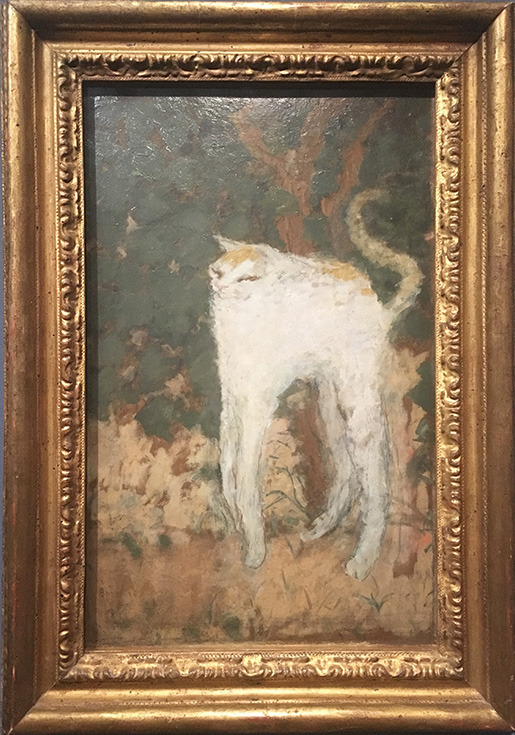
Grace Lavery wrote a piece for her newsletter right in the midst of my trip, and it struck a very deep chord:
That’s fourteen cities over which I find it difficult not to exert a personal claim, to feel like I am personally welcomed when I land. It’s the arrogance of the rootless cosmopolitan to flatter herself that some good luck finding a lunch spot in 2007, now equates to “local knowledge,” and...I develop these strange nonce claims about these fourteen cities, all of which are somehow illegitimate, and all of which mark me as one kind of interloper or another...
Of course, like all the best essays, it's not just about that, but about how these places, and our time in them, and our past selves, is something we can't come back to, and all of that tied into my feelings about Paris—the sense of ownership I have over the city, despite having lived there for four (maybe three) months when I was 11, how the city has changed irrevocably since then (and maybe never was what I romanticized it to be), and how it is tied so tightly with my mother's memory. I was surprised by this, and as a result, it was a huge portion of what I ended up writing about, despite the purported goal of only writing my novel. As the inimitable Art & Fear says:
If, indeed, for any given time only a certain sort of work resonates with life, then that is the work you need to be doing in that moment. If you try to do some other work, you will miss your moment.
With that, let's dive into the links, shall we?
The Public Domain Review has been one of my favorite recent finds, and their piece on what alphabet books used for X before X-rays is a delight:
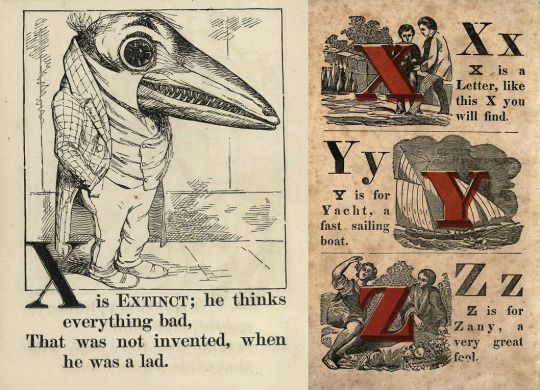
Lots on language to unpack, starting with the knowledge that apparently the word lox hasn’t changed meaning in 8,000 years, which is wild to me.
Two pieces on New York-adjacent accents, one on why working-class New Yorkers drop their “Rs” (i.e. “fawth flaw” instead of fourth floor), and I am delighted that the methodology was going to department stores in the 60s and asking for directions, and one diving into the American Jewish accent, which arises from its connection to Yiddish, which marks it as separate but still inter-related to the New York City accent because of the sheer number of Jewish people in New York City.
Los Angeles, on the other hand, has always had an incredible variety of strange pronunciations, what with its mix of Mexican heritage and transplants, and apparently San Pedro (PEE-dro) is in the midst of heated discussions on this, as the name itself becomes a shibboleth of whether or not you’re a transplant or not (which obviously has a lot to unpack!) I love that the historical society is very clear that they have no idea how this pronunciation originated, but they’re very keen on finding out.

I love, love, loved Catherine, Called Birdy as a kid (I still think of her inventing swears like "God's thumbs") so I was delighted to read this piece about the impact it’s had particularly on millennial women.
A lot of conversation recently has been around how it feels like time is passing us quickly by—or in the internet language this article is titled: everything happens so much. It's an insightful piece about our relationship with time, and how we've all become a bit "unmoored"
As the English writer and academic Mark Fisher tells us in Ghosts of My Life, in the 21st century we exist in “a general condition: in which life continues, but time has somehow stopped.” The “general trajectory” of the future has disappeared — and, with it, culture “has lost the ability to grasp and articulate the present.”
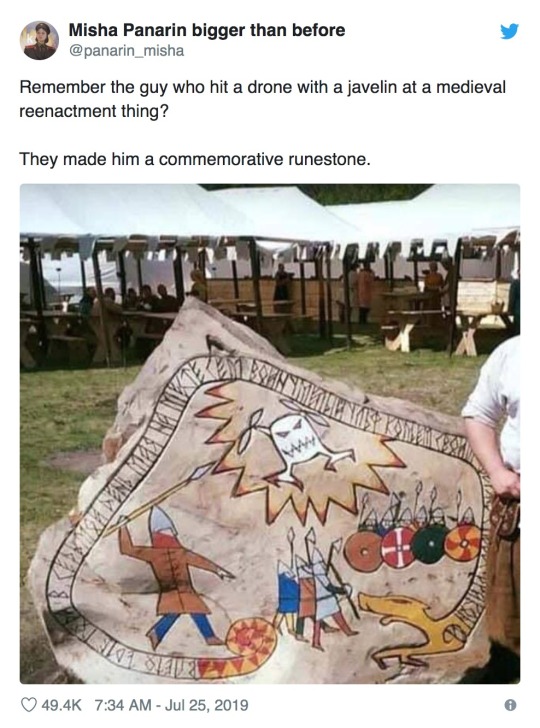
Oh, the CATS trailer dropped, and it is truly A Wild Ride (perhaps even more wild than my inaugural viewing of CATS at age 34, where at intermission I leaned over and asked "I'm sorry, what the hell is a Jellicle Cat?"), but fortunately it has left us with great headlines:

I spent time in quite a few museums, and managed to read this newsletter by Danny Ortberg while I was in a museum café eating an egg sandwich so please imagine the look on my face:
Man, I don’t know exactly what it is about the kind of cafe/restaurant that one encounters attached to museums and botanical gardens that brings out the most refined, Edwardian-style lady-of-leisure-who-lunches in me, but I can’t walk past one without being completely overwhelmed by the urge to order an $18 egg sandwich from a cold case, then pick at it for the next two hours at a small, circular table.
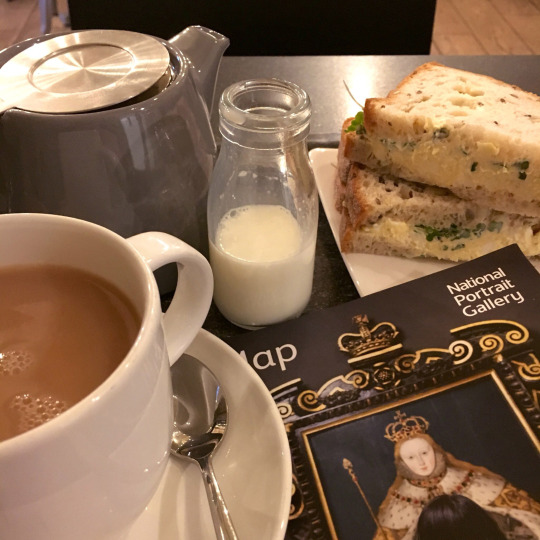
Etcetera: Boaty McBoatface makes major climate change discovery on maiden outing. Greta Gerwig has cast Timothée Chalamet as Laurie in the new Little Women and it’s perfect. Gail.com exists, and no she is not interested in selling. This Crab Clones Its Allies by Ripping Them in Half.
#I cannot believe lox is that old it's wild#how do you pronounce los angeles#museum cafes#cats trailer's weirdness is the best sentence opener
18 notes
·
View notes
Text
"THE FLAME TREES OF THIKA" (1981) Review
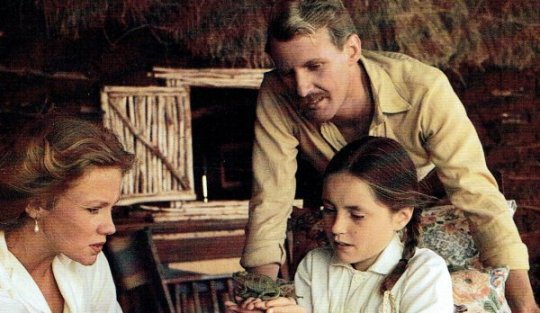
"THE FLAME TREES OF THIKA" (1981) Review
Some might find this hard to believe, but I used to be an avid viewer of PBS's "MASTERPIECE THEATER" years ago. Even when I was a child. That is right. Even as a child, I was hooked on period dramas set in Great Britain's past. One of the productions that I never forgot happened to be one that is rarely, if ever, discussed by period drama fans today - namely the 1981 miniseries, "THE FLAME TREES OF THIKA".
"THE FLAME TREES OF THIKA" is really a biopic - an adaptation of author Elspeth Huxley's 1959 memoirs of her childhood in Kenya during the last year of the Edwardian Age . . . that last year before the outbreak of World War I. The story begins in 1913 when young Elspeth Grant and her mother Tilly arrive in British East Africa (now known as Kenya) to meet her father, Robin. The latter, who is a British Army veteran, has plans to establish a coffee plantation. The Grants encounter many problems in setting up their new home. With the help of a Boer big game hunter named Piet Roos, they hire a Kikuyu local named Njombo to serve as translator for any new workers. Two of those workers are another local of Masai/Kikuyu descent named Sammy, who serves as the Grants' headman; and a Swahili cook named Juma. As life begins to improve for the Grants, they acquire new neighbors, who include a recently arrived couple named Hereward and Lettice Palmer, a Scottish-born former nurse named Mrs. Nimmo, a young and inexperienced farmer named Alec Wilson and a very dashing big game hunter named Ian Crawford. However, just as the Grants were learning to adjust to life in British East Africa, World War I begins and they are forced to adjust to a new future all over again.
Overall, "THE FLAME TREES OF THIKA" struck me as a pretty decent production. It is a beautiful series to look at, thanks to Ian Wilson's cinematography. He did a marvelous job in recapturing the space and scope of Kenya. Yes, the miniseries was filmed on location. My only qualm is that Wilson may have used slightly inferior film stock. The production's color seemed to have somewhat faded over the past twenty to thirty years. Roy Stannard's art direction greatly contributed to the miniseries' look. I can also say the same about Maggie Quigley's costume designs. They looked attractive when the scene or moment called for borderline glamour. But Quigley remained mindful of her characters' social standing, age and personalities. I feel that Stannard and Quigley, along with production managers Clifton Brandon and Johnny Goodman did a very good job in recapturing the look and feel of colonial pre-World War I East Africa. Let me clarify . . . colonial East Africa for middle-class Britons.
I might as well be frank. Many years had passed between the first and last times I saw "THE FLAME TREES OF THIKA". It took this recent viewing for me to realize that the production's narrative was not as consistent as I had originally assumed it was. Let me put it another way . . . I found the narrative for "THE FLAME TREES OF THIKA" a bit episodic. I tried to think of a continuous story arc featured in the miniseries, but I could only think of one - namely the love affair between Lettice Palmer, the wife of the Grants' boorish neighbor; and big game hunter Ian Crawford. And this story arc only lasted between Episodes Three and Seven. Otherwise, the viewers experienced vignettes of the Grants' one year in East Africa. And each vignette only seemed to last one episode. I must admit that I found this slightly disappointing.
There were some vignettes that enjoyed. I certainly enjoyed Episode One, which featured the Grants' arrival in East Africa and their efforts to recruit help from the locals to establish their farm. I also enjoyed those episodes that featured the Grants and the Palmers' efforts to kill a leopard; a major safari in which Tilly Grant, the Palmers and Ian Crawford participated in Episode Six; and the impact of World War I upon their lives in the miniseries' final episode. However, I had some problems with other episodes. I found Episode Two, which featured young Elspeth's rather strange New Year's experiences nearly boring. Nearly. I must admit that some of the characters featured in that particular episode struck me as rather interesting. The episode that featured a personal quarrel between the Grants' translator Njombo and their headman Sammy ended up pissing me off. It pissed me off because its resolution, namely an "Act of God" in the form Tilly, struck me as a typical example of European condescension . . . even in the early 1980s.
The performances for "THE FLAME TREES OF THIKA" struck me as pretty first-rate. I rather enjoyed Hayley Mills and David Robb's performances as young Elspeth's parents, Tilly and Robin Grant. Although both actors came off as likable, they also did an excellent job in portraying Tilly and Robin's less than admirable qualities . . . including an insidious form of bigotry. What I am trying to say is . . . neither Tilly or Robin came off as overt bigots. But there were moments when their prejudices managed to creep out of the woodwork, thanks to Mills and Robb's subtle performances. Sharon Maughan and Nicholas Jones were also excellent as the Grants' neighbors, Lettice and Hereward Palmer. It was easier for me to like the delicate and ladylike Lettice, even though there were times when she came of as self-absorbed. Jones' Hereward struck me as somewhat friendly at first. But as the series progressed, the actor did a great job in exposing Hereward's more unpleasant nature, which culminated in the safari featured in Episode Six. Ben Cross gave a charming and slightly virile performance as big game hunter Ian Crawford. But if I must be honest, the character was not exactly one of his more complex and interesting roles. But the one performance that shined above the others came from the then twelve year-old Holly Aird, who portrayed Elspeth Grant, the miniseries' main character. Not only did Aird give a delightful performance, she also held her own with her much older cast mates. Quite an achievement for someone who was either eleven or twelve at the time.
There were other performances in "THE FLAME TREES OF THIKA" that I found impressive. Carol MacReady was entertaining as the somewhat narrow-minded Mrs. Nimmo. Mick Chege gave a charming performance as the always cheerful and popular . David Bradley's portrayal of young neighbor Alec struck me as equally charming. Paul Onsongo gave a solid performance as the Grants' major domo/cook Juma. However, Onsongo's last scene proved to be very complex and interesting when Juma discovered that he could not accompany the Grants back to Britain. One of the series' most interesting performances came from William Morgan Sheppard, who portrayed Boer big game hunter, Piet Roos. The interesting aspect of Sheppard's performance is that although he conveyed Roos' more unpleasant and racist side in Episode One, he did an excellent in winning the audience's sympathy as his character dealt with the even more unpleasant Hereward Palmer during the leopard hunt in Episode Five. Another interesting performance came from Steve Mwenesi as the Grants' headsman, Sammy. Mwenesi did an excellent job in portraying the very complex Sammy. The latter seemed so cool and subtle. Yet, Mwenesi also made audiences aware of Sammy's emotions by utilizing facial expressions and his eyes.
Overall, "THE FLAME TREES OF THIKA" was an entertaining production that gave audiences a peek into the lives of colonial Britons during the last year of peace before the outbreak of World War I. Realizing that the story deal with members of the British middle-class and the Kikuyu and Swahili locals, the production team ensured that the miniseries was rich in atmospheric details without over-glamorizing the setting and costumes. And although the miniseries' narrative came off as somewhat episodic, I also managed to enjoy the performances of a first-rate cast led by Hayley Mills, David Robb and an enchanting Holly Aird.
#the flame trees of thika#british empire#colonialsim#world war 1#elspeth huxley#hayley mills#david robb#steve mwenesi#w. morgan shepphard#paul onsongo#ben cross#edwardian age#carol mcready#british colonialism#sharon maughan#nicholas jones#mick chege#roy ward baker#period drama#period dramas#costume drama#the flame trees of thika 1981
1 note
·
View note
Text
29/10/19 : TEDDY BOYS. HAUL GIRLS. #1
What are they?
Teddy Boy: (in the 1950s) a young man of a subculture characterised by a style of dress based on Edwardian fashion (typically with drainpipe trousers, bootlace tie, and hair slicked up in a quiff) and a liking for rock-and-roll music.
Haul Girl: A girl or women who makes a haul video.
The revolution will not be televised.
youtube
The tv shows you what it wants to show you.
Television tells us what the people who run the TV stations want us to know. But social media today sometimes provides an alternative.
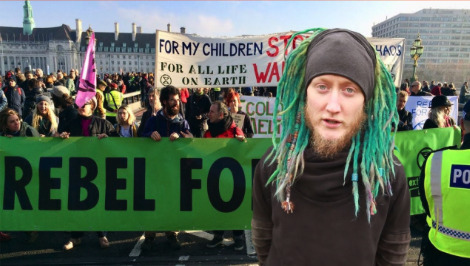
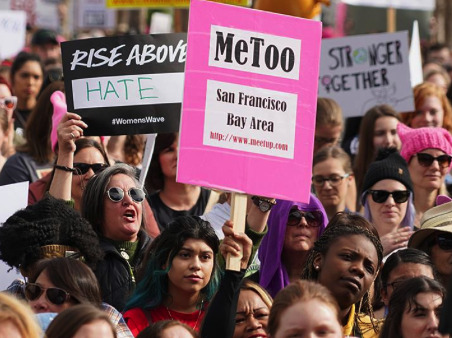

Subculture - Under/Beneath
We are looking today at youth and subcultures… their historicity and their contexts, and where we are with what might be called subcultures and youth cultures today.
GUIDE TO THE CULTS
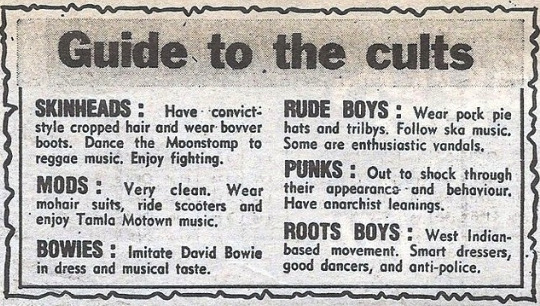
A genuine piece from the mirror in the 1980s.
youtube
Sex Pistols : This is one of the most infamous moments on television. Today it seems tame, but in 1976 this was enough to get the presenter fired.
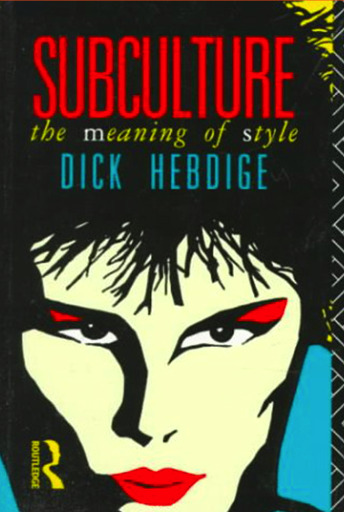
Like Duchamp's 'ready mades' - manufactured objects which qualified as art because he chose to call them such, the most unremarkable and inappropriate items - a pin, a plastic clothes peg, a television component, a razor blade, a tampon - could be brought within the province of punk (un)fashion...
Dick Hebdige - Subculture: The Meaning of Style
Hebdige’s book has long been consider the authorative text on subculture.
In the book he discusses the ready made aesthetics of punk. Punk was the first reaction to the developing politics of Thatcher and Reagan… here a refusal to take part in business as normal led to music that sounded amateur and fresh… the opposite of the progressive rock that had dominated the mid 1970s and early 80′s.
Vivienne Westwood
Objects borrowed from the most sordid of contexts found a place in punks' ensembles; lavatory chains were draped in graceful arcs across chests in plastic bin liners. Safety pins were taken out of their domestic 'utility' context and worn as gruesome ornaments through the cheek, ear or lip...fragments of school uniform (white bri-nylon shirts, school ties) were symbolically defiled (the shirts covered in graffiti, or fake blood; the ties left undone) and juxtaposed against leather drains or shocking pink mohair tops.
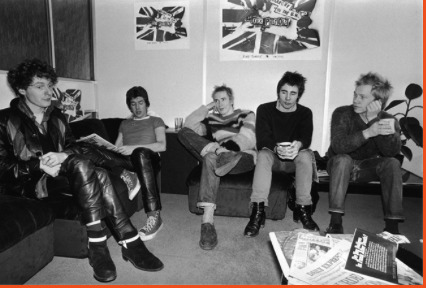

Jamie Red and others made zines that could be assembled in this same way, collaging and making work that felt it could have been made in the house, and often was.
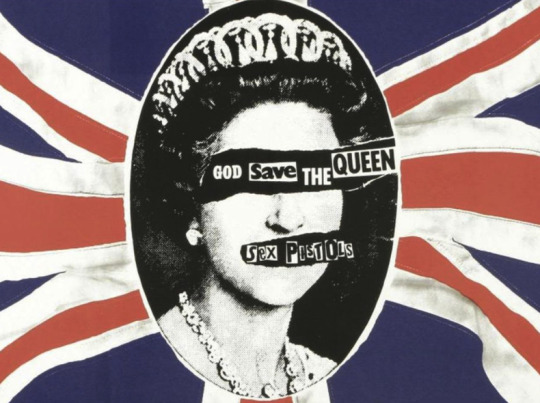
Subcultures
Subcultures are tribal, bringing people together to form loose relations outside of the mainstream.
Different subcultures:
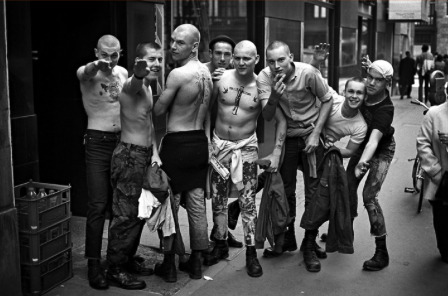
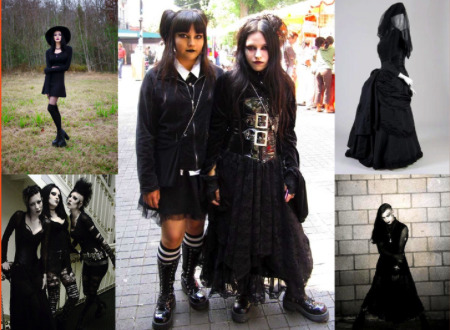
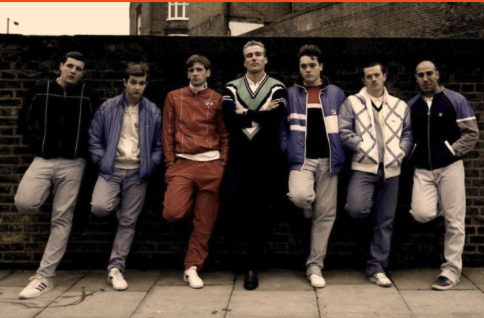
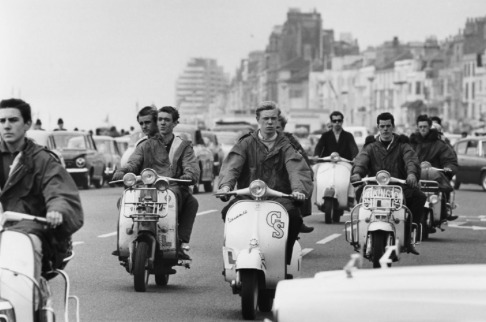
Even subcultures have subcultures… specific types of goth (steampunk, lolita) rude boys, K Pop sub genres, grunge punk rock etc
Once about a specific youth culture movement based around the disco music of the 1970s, clubbing subculture developed into rave culture in the late 80s and 90s, and has become a mainstream movement in the last few years.

Fiorucci Made Me Hardcore, Mark Leckey, 1999
youtube
“Something as trite and throwaway and exploitative as a jeans manufacturer can be taken by a group of people and made into something totemic, and powerful, and life-affirming.”
Subcultures are about a sense of belonging, often to people who feel excluded or disenfranchised from the mainstream.
youtube
Cosplay - form of subculture
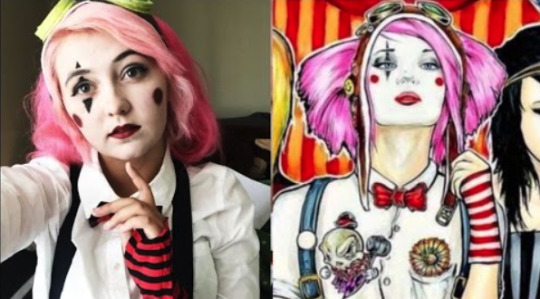

The Joker and Harlequin are both characters who live for misrule, and both of them come from characters in the commedia dell’arte.
Harlequin relates directly to Harley Quinn… the Lord of Misrule was the peasant who was given the task of making sure that Xmas revellers got very drunk and very naughty.
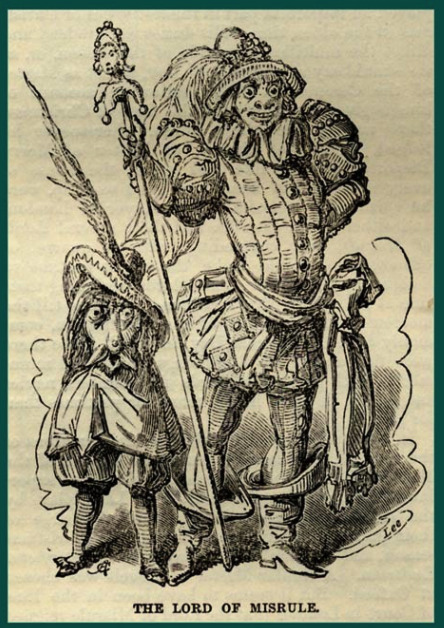
The World Turned Upside Down
These characters link back to the ideas of the carnival, a time when the world was turned upside down. Christmas was initialy this kind of festival. People didn’t know if they would make it through the winter, so they made merry whilst they could. In the carnival Kings become Jokers, Jokers became kings.
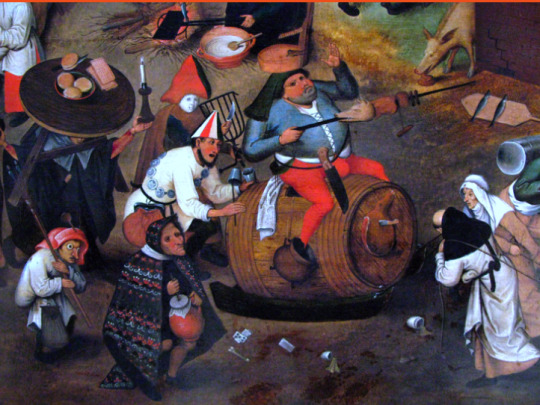
Carnival extracts all individuals from non-carnival life, non-carnival states and because there are no hierarchical positions during carnival, ideologies which manifest the mind of individuals cannot exist.
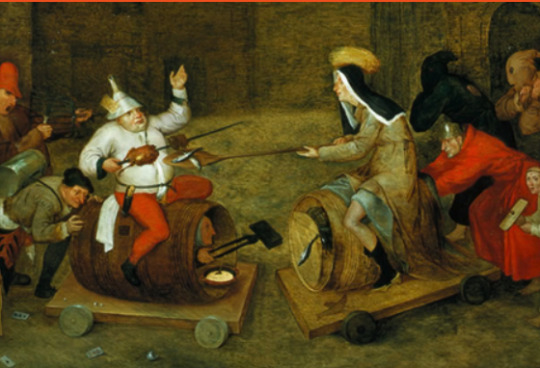
...And finally in a few relatively rare instances, we find an extreme form of revelry in which the participants play-act at being precisely the opposite of what they really are; men act as women, women as men, kings as beggars, servants as masters, acolytes as bishops. In such situations of true orgy, normal life is played in all manners of sins such as incest, adultery, transvestitism, sacri- lege, and lese-majeste treated as the order of the day...
Edmund R. Leach, Rethinking Anthropology
In Rabelais and His World (1965), Mikhail Bakhtin likens the carnivalesque to the type of activity that often takes place in the carnivals of popular culture. In the carnival, according to Bakhtin, social hierarchies of everyday life—their etiquettes, and normal structures—are turned on their head.
Court jesters become kings, kings become beggars; opposites are mingled (fact and fantasy, heaven and hell).
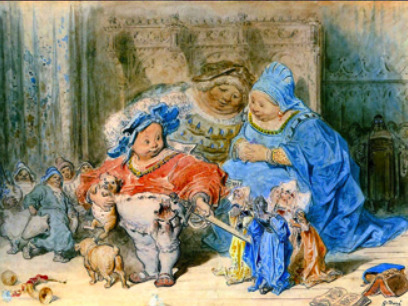
Drag Cultures

Much in the same way that Madonna, undeniable icon though she is, in no way invented voguing, neither did the queens on RuPaul’s Drag Race invent the concept of "shade", "realness" or any of the other essential sayings liberally adopted wholesale by the internet. But what the show has done is continually provide a potted queer history. Whether it’s through highlighting ball culture, trans activism, gender fluidity, or queens like the legendary Lady Bunny; or simply by allowing the contestants to talk about their lived experience, the show has put an all too rare slice of gay and trans history in American (and the world’s) living rooms and laptops.
Drag Race has brought a subculture into the mainstream. It has brought secret languages into modern parlay.
From RuPaul raising a pair of opera glasses to say archly, “I can’t wait to see how this pans out”, to season four queen Latrice Royale’s “the shaaaaade of it all”, social media’s gif game has been vastly bolstered by nine seasons of this show. A gif reaction needs to encapsulate maximum emotion, drama, and appearance – and the queens on Drag Race have all three in spades. Tumblr couldn’t create gifs fast enough in the early seasons, and the joy of so many strong characters, and sound-bites, means that there is a reaction for absolutely every occasion. Season 6 winner Bianca Del Rio named one of her world tours after her own much-gif’d catchphrase, “Not today Satan”.
Memes and online culture have helped the show become part of the everyday.
Historically, "sissy" has been used as an insult against feminine-seeming men. Ru-Paul’s Drag Race not only reclaims the word – “now sissy that walk” is the phrase said at the top of each catwalk, usually preceding a demonstration of almost gob-smacking creativity – but shows that adopting a truly feminine character requires massive amounts of charisma and self-confidence. The show is wildly popular with women, not simply because of the incredible looks and transformations served by each queen, but because it is a celebration of feminine mystique in all its forms.
It has helped reclaim a sense of agency in an era of toxic masculinity.
The little show that could has turned into a global behemoth, with tours around the world each year, and an annual convention in Los Angeles. Last year, a second US convention launched in New York, while London hosted the first European edition, DragWorld UK, which saw a number of the show’s queens and RuPaul’s right-hand judge, Michelle Visage, holding court. And as fabulous, glamorous and downright funny as the queens are, the real joy came from seeing the response of teenagers to meeting their idols. RuPaul and Visage are giving hope to lost kids around the world, whatever their gender, ethnic background or sexuality. By sharing their stories, the Drag Race contestants are giving comfort and inspiration to viewers, as well as swathes of entertainment.
The show has brought disenfranchised, often hidden cultures into the open. And given people something that not only entertains, but also empowers.
The difference between Drag Race US and Drag Race UK summed up in one perfect tweet…
With RuPaul’s Drag Race UK finally airing on both sides of the Atlantic Ocean, it’s got fans realising just how different the two editions of the show are… International fans were subjected to the colourful world of British slang and swear words, leaving dozens bemused about what exactly the UK queens are actually saying…. But in a viral tweet shared by one of the British queens, it’s managed to capture the crucial difference between the US and UK versions of Drag Race.
Sum Ting Wong shared a screenshot of a Facebook post that so beautifully sums up the two shows:
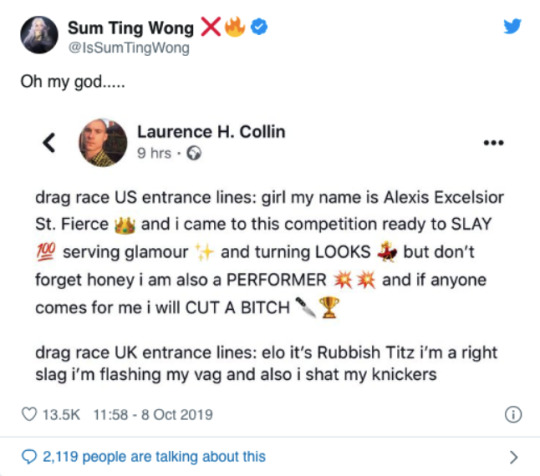
Pink News JOSH MILTON OCTOBER 8, 2019
Drag is culturally derived, and finds its forms based on local customs. In the UK drag has a relationship to Vaudeville and play, which means it does something different to the american show. It is less about the act of putting on a show, and more about the comedic, slightly catty relations that we have come to associate with saturday evening tv here in the UK.
But that doesn’t mean it is mean in itself… it still brings a subculture to a mainstream audience. Remember, if I talked about this with you in the 1990s, I would face prosecution under Section 28
"shall not intentionally promote homosexuality or publish material with the intention of promoting homosexuality" or "promote the teaching in any maintained school of the acceptability of homosexuality as a pretended family relationship".
New Subcultures

‘It's hard not to be struck by the sensation that, emos and metalheads aside, what you might call the 20th-century idea of a youth subculture is now just outmoded. The internet doesn't spawn mass movements, bonded together by a shared taste in music, fashion and ownership of subcultural capital: it spawns brief, microcosmic ones.
In fact, the closest thing to the old model of a subculture I've come across is Helena and the haul girls. Their videos are about conspicuous consumption: a public display of their good taste, carefully assembled with precise attention to detail. When you put it like that they sound remarkably like mods.’
Alexis Petridis
Marie Antoinette, 2006 (Sofia Copolla)
youtube
3 notes
·
View notes
Text
Carpe Noctem
Author: Silent-Fields
Year: 2010
Rating: PG-13
Characters: Richmond, Anthrax & Ebola
Richmond watched as the children of the night careened about in a haze of smoke, extending their pale arms towards Heaven and Hell. After weeks of careful research, tonight was the night Richmond had decided to set out and experience his first goth club. He had chosen Pandora's Box because it offered two rooms spinning various genres, a lounge, and a very extensive bar. He was in the gothic room at the moment, enjoying the contrast of ethereal female vocals with demonic male ones echoing from the club's speakers.
With his last few paychecks as Project Executive, Richmond built himself up an extensive wardrobe, favoring mostly Victorian and Edwardian inspired styles, but liking the cuts on many of the more modern clothes as well. Most of his old clothes were then donated, but he did keep a few pieces. A purple dress shirt did look quite nice with a black tie. For his debut he wore a black frock coat, a black ruffled shirt whose cuffs dangled just enough over his hands to be dramatic but not a hindrance, and a maroon waistcoat. Black trousers and pointed boots completed his outfit. He had recreated the eye make-up he had done for Denholm's father's funeral, but chose to simply line his lips' natural shape rather than draw them into a frown. He wanted to be approachable, trying for subtle indifference with a hint of misery for tonight's look.
His parents had been more upset about his demotion than his new lifestyle. "You always liked The Addams Family and Tim Burton movies," his mother said with a shake of her head. "And there was that time your father took you to see Kiss. But Richmond dear, can you still support yourself?" Richmond had enough savings to cover any emergencies that may arise within the next few months and tended to live rather frugally, so the lower pay hadn't really bothered him. What had been surprising was how much more comfortable he was now, finding solace in the shadows of the night after years of corporate competition under harsh florescent.
Richmond had been so lost in reminiscing that he didn't notice two girls approaching him until they were right in front of him. The taller of the two was wearing a long black velvet dress with bell sleeves, her wavy blonde hair flowing over both her shoulders. The shorter girl's black hair was pinned back with spider shaped sliver clips, and she wearing a black knee-length tank dress with zippers on the straps, fishnet stockings, and combat boots. Both wore matching necklaces, a silver dagger on a satin cord that stopped at the tops of their breasts. Drinks in hand and small purses on their shoulders, they introduced themselves.
"Hello, I'm Ebola.” said the blonde, her manner stoic.
"And I'm Anthrax." said the other, her tone equally void of emotion.
"Richmond." He replied with a bow. Oh dear, should I have created pseudonym? Alabaster? No, sounds silly. Ammonite? Possibly too obscure. Maybe I should have used my last name, it does sound a bit more gothic . . .
"We haven't seen you here before, is this your first time?" Anthrax asked, interrupting his thoughts.
"Oh yes, yes it is."
"They seem to be playing older stuff tonight, not a bad night to drop in. Would you care to join us in the lounge?"
Richmond nodded and Anthrax's lips curled upwardly slightly, flashing the tips of a pair of fangs as she turned toward the door. Richmond followed as the girls effortless weaved their way through the dancing patrons towards the lounge. They sat on a vacant purple velvet settee while Richmond sat in an adjacent chair, the table in front of them covered with ashtrays and empty glasses. Candlelight and black fabric draped from the ceiling surrounded them. Ebola sat her glass down and fished a cigarette and lighter out of her purse while Anthrax and Richmond held on to their drinks.
"So Richmond, what do you do?" Ebola asked, lighting her cigarette. She held up her free hand before he could reply. "Wait, let me guess. Computer programmer? No no, graphic designer." Richmond furrowed his brow in confusion.
"Nearly every guy here works with computers," Anthrax explained. "It provides a relaxed office dress code and a pay check that supports the lifestyle."
"Oh. Um, I work in IT." It felt odd saying that, as Richmond still had no idea what kind of work he was expected to do. Though it is quite nice working in the basement.
"Ah." Anthrax took a sip of her drink, something dark red. "The bartender here is quite excellent, always coming up with some new delicious and deadly cocktail. I see you've gone with The Green Fairy."
"I quite like absinthe." Richmond replied with perhaps too much enthusiasm. He was drinking a cocktail of the previously mentioned bartender's own design. While lounge was relaxing, Pandora's Box was primarily a dance club, and did not lend itself to melting sugar cubes into luminous green filled glasses, so he settled for a mixed drink that contained some of his favorite liquor.
"Oh I'm sure you'll meet him eventually." Ebola said, rolling her eyes. Richmond looked quite confused.
"Absinthe is the owner and operator of a S&M club nearby." Anthrax explained. "It's members only with the exception of a few events throughout the year." She looked him up and down. "You could probably become a member without too much difficulty."
"Oh I see." Richmond wasn't quite sure how he was supposed to interpret that statement. "Um . . . are you members?"
"Yes." Ebola replied, taking a drag from her cigarette. "Why, are you interested?"
"Not now, maybe one day." Richmond shifted and took a sip of his drink. He noticed Anthrax looking him again and he suddenly wondered if maroon was too bright of a colour for the occasion.
"This isn't just your first time here is it?" she asked. "It's your first time out a goth club."
Richmond blinked. "Oh dear, was it obvious?"
"A bit" she replied, her fangs once again peeking out over her near smile.
"Oh. Well I am still feeling my way around the culture." he admitted
"It does get associated with a lot of different things." Anthrax commented.
"How did you become interested in the lifestyle?" Ebola asked, placing her cigarette on the closest ashtray.
"Cradle of Fifth." he replied, hiding his grin with a sip of his drink. "May I ask you two what interested you in becoming goth?"
"Sure," Ebola said with a shrug. "For Anthrax it was The Hunger, that film with David Bowie as a vampire and Susan Sarandon's lesbian scene. If that wasn't enough the moment we start the film she's shaking me asking 'What's this song? Who's that bloke in the cage??'"
Anthrax glared at Ebola. "You're the one with the thing for David Bowie." She turned to Richmond, "My older brother was into the scene as well so I'd often watch him put on his make-up before he went out and developed an interest from there. As for Ebola, she fancied my brother."
"That wasn't the only reason, you cow." She glared back at Anthrax before replying. "I always loved Lydia's outfits in Beetlejuice, I wanted to dress like her every day. But it was so distressing to see her so happy and normal looking at the end of the film."
"Oh yes, I agree. Even if the song is very catchy." Richmond swirled his drink in his glass, watching the bright green whirlpool, wondering what question to ask next. Perhaps they know someplace that provides a more appropriate atmosphere for drinking absinthe . . .
Ebola reached for her cigarette, noticing a man walking quickly past them. "Good Evening, Lord Catalyst." she called out. The man froze and turned around with a grimace on his face. He was dressed similar to Richmond, but had chosen to accessorize with a top hat and cane.
"You two!" he said with a slight twitch, pointing his finger accusingly. He turned to Richmond dramatically, his cape swirling to match his movement. "Take heed my dear fellow! They are harpies, who will snatch away your soul!" He glared at the two girls on the settee. "I do not mean this as a compliment!"
"Oh fuck off!" Ebola hissed. "Or shall we tell him why you're so uncomfortable around us?" Lord Catalyst jumped, his twitch increasing in intensity, and scuttled away.
Both girls exchanged a look and a snicker before turning to Richmond.
"I'm sorry Richmond. We . . . collect boys on occasion but tonight we were just looking for conversation," explained Anthrax. "Though you are very handsome.” Ebola added.
"That's quite alright. I must say, you both have beautiful skulls."
"Thank you," they replied in unison.
They spent the rest of the evening chatting away in the lounge, occasionally getting up to dance when a song came on that the girls insisted Richmond must dance to. Soon the antique grandfather clock in the lounge struck three, signaling that the evening was at an end.
"You've both been very helpful. Thank you." said Richmond as they exited the club, trying not to smile.
"There isn't a goth rule again smiling, Richmond." Ebola said with a laugh. "Just don't make it a regular habit." After exchanging phone numbers and email addresses the group went their separate ways, with the promise to meet again soon.
-----------------------------------
For the first couple of years they were always out together; going to clubs and films and tea parties in graveyards, meeting up to chat and shop and dance. Anthrax and Ebola quickly discovered Richmond had no trouble pulling, his shy demeanor combined with his theatrical delivery proved highly amusing and rather attractive to both goths and non-goths of all genders. Sometimes they would meet just to compare notes on their various conquests. As the years went on Richmond began to come out less and less, mainly communicating by email and only occasionally by phone. He would still show up to major events and travel with them for Whitby, but Richmond slowly withdrew into his own world as Anthrax and Ebola continued to venture out in to the night.
-----------------------------------
Neither Ebola nor Anthrax had seen Richmond for months and after weeks of persistent emails and phone calls, he agreed to come out. Before heading to Pandora's Box they decided to meet up at a near by cafe, sitting in a booth in the back corner, for privacy as well as ambience. Always a gentleman, Richmond waited until the girls had settled before sitting down. Anthrax sat near the wall, dangling her fingers over the table candle as she waited for her tea bag to steep. Ebola stirred her coffee, watching the creamer swirl. Both waited silently, wanting Richmond to speak first. He stared at his coffee, watching the stream curl out of the mug for a while before speaking.
"My old boss committed suicide. He just jumped out of a window one day." Anthrax gasped and Ebola jumped slightly. That wasn't the whole story of course, but Richmond didn't feel like explaining that the pensions at Reynholm Industries had been tampered with for years and if Denholm had chosen to think about it, there had probably been an easy way to fix them. But Denholm has always been impulsive and unpredictable, up until the last moments of his life.
"The one that demoted you?" Ebola asked carefully. Richmond nodded, still not looking up at either of them.
"I slept with him shortly before it happened. It wasn't anything serious; I knew that before we did anything. In a way it sort of felt like closure." Richmond took a slip of his coffee, continuing to look at the table. "I wasn't allowed to attend the funeral, but at the time it didn't really bother me. As the weeks went on though, I found myself becoming rather depressed."
"How are they treating you at work?" asked Anthrax.
"Oh much better, I'm allowed out during daytime hours now. I still don't talk to my coworkers much - don't really see a reason to. I'm just sort of . . . there." Richmond looked up, saw two pairs of sympathetic looking milky lenses, and looked back down. "I'm not quite sure what to do with myself now."
Ebola looked at Anthrax, biting her lip slightly. They searched each other eyes for the right words. Today it was Anthrax's turn to have the epiphany, eyes widening as she turned to face Richmond once more.
"Richmond, do you remember the last thing that came out of Pandora's Box?"
Richmond looked up from his drink at Anthrax, allowing his frown to become one of confusion rather than despair. She reached across the table and took hold of one of his hands.
"It was hope."
Richmond blinked, his mouth forming a silent "Oh". Ebola reached across and took hold of his other hand, both girls squeezing before letting go. The friends finished their drinks in a comfortable silence.
"I think it's the industrial room tonight my dears." Ebola said as she began to rise out of the booth. "We can dance the night away and count how many times someone samples Dune."
"No complaints here." Richmond replied, waiting until Anthrax was out of the booth before standing, trailing behind them both as they walked toward the front.
"Oh Richmond we must tell you about this ridiculous boy we met at The Black Spider." Anthrax turned as he held the cafe door open. "He looked a bit like you but lacked your depth. When we asked him what his favorite song was he said it was Gary Numan's Dominion Day."
Richmond sneered slightly as he followed her out. "First time?"
"First and last, thankfully."
And so the friends set out to drink and dance, extending their arms towards the infinite possibilities that lay ahead of them, capturing the night in their pale hands.
#the mighty boosh#mighty boosh#boosh#richmond avenal#anthrax#ebola#anthrax & ebola#the it crowd#it crowd
4 notes
·
View notes
Text
august book roundup
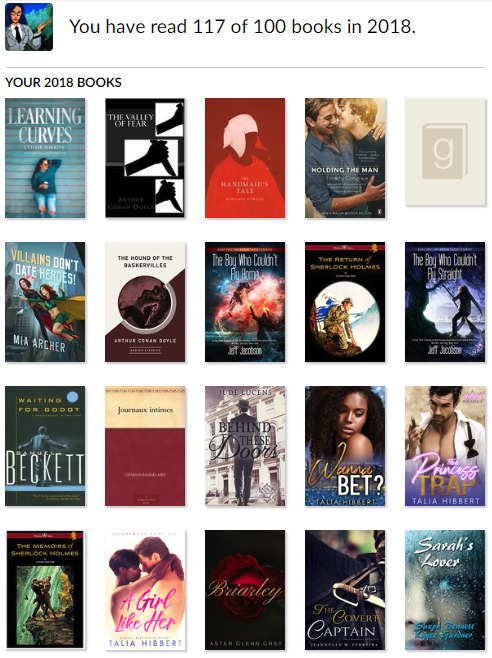
18 books this month! i didn’t slow down as much as i thought i would lol. i love books y’all.
a girl like her - talia hibbert ⭐️⭐️⭐️⭐️ pretty cute romance with a black autistic heroine. i’d read more het if they involved prickly, irritable girls (who are no less lovable because of it) and nice dudes. he cooked for her nonstop! was adorable.
the memoirs of sherlock holmes - arthur conan doyle ⭐️⭐️⭐️⭐️ nth reread. contains some of my very favourite stories. whisper norbury in his ear watson!
the princess trap - talia hibbert ⭐️⭐️⭐️ cute stuff. i’m not in love with romances about billionaires and princes and whatever, but the plot and conclusion to this one went against the grain in a couple ways and left me pretty satisfied.
wanna bet? - talia hibbert ⭐️⭐️⭐️⭐️ another het romance where the dude is nice enough but i’m just. i was in LOVE with this heroine. i saw so much of myself in her, which isn’t necessarily a good ting, given how self destructive she could be, but it's always nice to see people with flaws like your own falling in love and being happy and taking steps towards getting better. i really like hibbert’s heroines, and i’ll be reading more of her books in the future. (also..... pls write some lesbians......... pls...................)
behind these doors - jude lucens ⭐️⭐️⭐️⭐️⭐️ FAVE BOOK OF THE MONTH. QUEER EDWARDIAN POLY ROMANCE. MADE ME FEEL LIKE FIFTEEN EMOTIONS.
journaux intimes - charles baudelaire ⭐️⭐️ one day i hope to be famous enough to write a bunch of shitposts, put them in a diary, sell it and still be making bank hundreds of years later. some of baudelaire’s poetry is truly lovely but i was not impressed by his inmost thoughts. i’m not totally fluent in french so maybe some things got lost in translation? but jesus he seems insufferable.
en attendant godot - samuel beckett ⭐️⭐️⭐️ reread. had a sudden urge for some absurdity. don’t know why. sometimes, that’s just how it is on this bitch of an earth.
the boy who couldn’t fly straight (1-2) - jeff jacobson ⭐️⭐️ teen novels heavily inspired by harry potter except the protag is gay! i thought i’d love these but alas, they were not well written or plotted at all, and when they weren't boring me they were annoying me. had some cute stuff tho.
the return of sherlock holmes - arthur conan doyle ⭐️⭐️⭐️⭐️ nth reread. some more of my favourite stories. the adventure of charles augustus milverton has such a special place in my heart.
the hound of the baskervilles - arthur conan doyle ⭐️⭐️⭐️ nth reread. i just love the ATMOSPHERE of this novel, even if i don’t love it as much as some of the others.
villains don’t date heroes! - mia archer ⭐️ DON’T JUDGE BOOKS BY THEIR COVERS. this one looks very cute! a villain falling in love with her arch-nemesis heroine. cute right? WRONG this was tedious and boring and just. not very good.
the ape, the adman and the astronaut - tham kai meng ⭐️⭐️⭐️ short book about advertising and storytelling. interesting enough.
holding the man - timothy conigrave ⭐️⭐️⭐️⭐️ autobiography of a gay austrailian mad who contracted HIV in the 1980s. made me cry! didn’t like him very much all the time but it was good to get a slice of history.
the handmaid’s tale - margaret atwood ⭐️⭐️⭐️ see i liked this. i liked it a lot? but i also didn’t like it very much. i went into it completely blind, without knowing anything about it other than something something feminism and i’m glad i did. i don’t like atwood’s prose or style but this is the kind of thing i’d want to read more of.
the valley of fear - arthur conan doyle ⭐️⭐️⭐️ nth reread. always enjoyable. i’m always struck by how much i don’t particularly like any of doyle’s main men, other than watson and holmes.
learning curves - ceillie simkiss ⭐️⭐️⭐️⭐️ a very very very sweet new adult f/f romance. seriously made my heart flutter. T__T
aaaaand that’s it! for september i’ll be concentrating on reading more kindle unlimited books until my subscription runs out. thinking of delving into a few more ‘famous’ book or some of the classics, just to see what i think. currently reading slaughterhouse-five by kurt vonnegut; liking it a lot even if not everything about the prose works for me. also relistening to an audiobook of his last bow.
5 notes
·
View notes